The Catholic Church in Bénin Republic is celebrating the 150th Anniversary of the arrival of the first missionaries – priests of the Society of African Missions – throughout 2011. Pope Benedict XVI will visit Benin in Novemebr 2011 as part of the celebrations. Fr Renzo Mandirola SMA has written extensively on the early history of the SMA, with particular reference to a giant of SMA history – Fr Francesco Borghero SMA – as well as several spiritual books. The text below is from a talk he gave to Béninois priests studying and living in Rome in May 2011. An English translation will be provided shortly.
The Evangelization of Dahomey
the first missionaries
1. Le Dahomey et la SMA : un lien privilégié
1.1. Mgr de Marion Brésillac (1813-1859)
1.1.1. Il part pour l’Inde comme MEP en 1842.
1.1.2. En 1845 il est nommé évêque.
1.1.3. En 1854 il quitte l’Inde pour Rome afin de s’expliquer.
1.1.4. En mars 1855 Pie IX accepte sa démission.
1.1.5. Dans le couvent des capucins à Versailles le gardien, le P. Ambroise de Bergérac, le met en contact avec M. Régis, qui a des comptoirs sur la côte ouest de l’Afrique et qui verrait de bon œil l’arrivée de missionnaires catholiques[1].
1.1.6. À la fin de l’année 1855 il part pour Rome.
1.2. Mgr de Marion Brésillac et le Dahomey.
1.2.1. Le 4 janvier 1856, il présente à la Propagande un Rapport « au sujet d’une nouvelle mission à établir dans le Royaume de Dahomey »[2].
1.2.2. La Propagande, à travers son secrétaire Mgr Barnabò, lui demande de fonder un Institut qui puisse assurer une continuité à son travail en Afrique.
1.2.3. Le 8 décembre 1856 il fonde à Lyon la SMA.
1.2.4. Il demande avec insistance à la Propagande le Dahomey : 4 janvier 1856, 26 février 1856, 23 juin 1856, 20 juillet 1856, 6 août 1856, 12 novembre 1856, 13 décembre 1856.
1.2.5. Le 3 mars 1857 il se dit prêt à accepter une autre mission, « sauf à nous charger plus tard du Dahomey si vous le désirez »[3].
1.2.6. Le 27 avril 1857 et le 12 septembre le card. Barnabò lui signifie que ce ne sera pas le Dahomey mais la Sierra Leone son nouveau champ d’apostolat. Ce n’est pas ce qu’il voulait mais il accepte et il en écrit à la Propagande en ces termes : « Aussitôt, Éminence, j’ai fait part de ces lettres à mes associés, et j’ai le plaisir de vous faire savoir qu’unanimement ils sont entrés dans l’esprit qui animera, j’espère, toujours notre Société, en déposant instantanément le désir que nous avions de commencer notre œuvre par le Dahomey, afin d’entrer purement et simplement dans les vues de la S.C. de la Propagande. Nous accepterons donc avec joie la mission de Sierra Leone »[4].
1.2.7. Le premier groupe SMA (Reymond, Bresson et le frère Eugène) part de Marseille le ¾ novembre 1858. Le deuxième (Brésillac, Riocreux et frère Gratien) part de Brest le 11 mars 1859.
1.2.8. Le 18 juin 1859, il manque une semaine à sa mort, il a encore le courage d’écrire au P. Planque : « Malgré tout cela[5], j’irai seul, si c’est possible, le mois prochain, faire un voyage au Dahomey pour voir s’il ne vaudrait pas mieux fonder là un centre »[6].
1.3. Le P. Augustin Planque (1826-1907)
Lorsque Mgr de Brésillac meurt à Freetown, il ne reste à Lyon que deux prêtres (Planque et Borghero) et quelques séminaristes. Planque, après avoir consulté les autres, s’en va dire au Pape que, malgré le nombre et les avis contraires, ils sont tous disposés à poursuivre l’aventure du Fondateur.
1.3.1. Pendant qu’il se trouve à Rome pour rencontrer le Pape Pie IX et le card. Barnabò, Planque écrit à ce dernier : « Votre Éminence sait aussi que jusqu’au 12 Septembre I857, jour où fut expédié à Mgr de Brésillac le duplicata d’une lettre perdue du 27 Avril de la même année, nous avons toujours demandé la Mission du Dahomey; et lors même que le Vicariat apostolique de Sierra Leone nous eût été offert et que Mgr de Brésillac l’eût accepté, nous n’avons jamais perdu de vue que c’est le Dahomey qui a fait naître notre Congrégation. […] Vous ne vous étonnerez donc pas, Éminence, que je poursuive le même but et que je vous demande le Dahomey. […] Il me semble, Éminence, que mourir pour mourir, le martyre du sang serait plus avantageux à la Religion et au missionnaire que celui des fièvres; au moins ce sang versé nous donnerait une palme et une auréole au ciel, et nous pourrions voir se réaliser cette parole qui a toujours été une vérité dans l’Église de Dieu : Sanguis martyrum, semen christianorum »[7].
1.3.2. Le 28 août 1860 le Saint-Siège érige le Vicariat apostolique de Dahomey (entre les fleuves Volta et Niger) et le confie au Séminaire des Missions Africaines.
1.3.3. Le 2 décembre 1860, le P. Francesco Borghero est nommé Supérieur ad intérim du Vicariat apostolique du Dahomey. En sa qualité de chef de mission, le 5 janvier 1861, il part de Marseille avec les PP Fernandez Francisco (espagnol) et Edde Louis (français).
2. Le Fondateur de la Mission du Dahomey : le P. Francesco Borghero
2.1. Biographie succincte
2.1.1. Il naît à Ronco Scrivia (33 Km de Gênes) le 19 juillet 1830, premier de 12 frères.
2.1.2. Famille pauvre ; son oncle s’occupe de lui et de ses études (chez les Jésuites à Voghera et au Séminaire de Gênes).
2.1.3. Le 10 septembre 1852 il part pour Subiaco, près de Rome, avec l’Abbé bénédictin Casaretto qui dans les années 1850 fonde la Congrégation Sublacense (jusqu’en 1959 : Congregazione Cassinese della Primitiva Osservanza) qui se détache de la Congrégation cassinese.
2.1.4. Il enseigne pendant 5 ans la Rhétorique (le cursus studiorum comprenait à ce moment Grammatica, Umanità e Retorica).
2.1.5. Il est ordonné prêtre le 27 décembre 1854 « titulo missionis ».
2.1.6. En novembre 1857 il quitte Subiaco, ne pouvant réaliser son désir de partir pour les Missions.
2.1.7. En juin 1858 il rencontre à Rome Mgr de Brésillac et il part avec lui à Lyon.
2.1.8. Il part le 5 janvier 1861 (Canaries, Dakar, Freetown où meurt le P. Edde) et arrive le 18 avril à Ouidah
2.1.9. Quatre ans après, le 12 janvier 1865, il s’embarque à Lagos pour l’Europe.
2.1.10. Au début de janvier 1868, la Propagande lui demande de se mettre de côté, pour le bien de la SMA.
2.1.11. Quelques mois après cela il est à côté de Pise, à Migliarino Pisano, précepteur dans la maison du duc Scipione Salviati. Il y reste une quinzaine d’années.
2.1.12. Il refuse un Vicariat en Afrique centrale en 1882 à cause de sa santé, mais se dit disponible pour un vicariat en Égypte en 1886, ma cela ne se concrétise pas.
2.1.13. En 1890 on le trouve directeur spirituel dans un des deux séminaires de Gênes (chez les Figli di Santa Maria Immacolata qui ont aussi une maison in via del Mascherone, à Rome).
2.1.14. Il meurt dans son village le 16 octobre 1892, d’un cancer à l’estomac.
2.2. Sa formation
2.2.1. Sa formation se fait dans trois endroits importants : le collège de Jésuites à Voghera, le Séminaire de Gênes et le monastère bénédictin de Subiaco.
2.2.2. Il a une solide culture théologique, humaniste (ses lettres sont pleines de citations non seulement de la Bible ou de théologie, mais aussi des auteurs classiques)et scientifique ; ce qui permet au P. Planque de le proposer comme pro-vicaire : « il connaît les langues européennes les plus répandues dans ces contrées: le Français, l’Anglais, l’Italien, l’Espagnol, un peu de Portugais et d’Allemand, et en outre il apprend très-vite un idiome nouveau. Votre Éminence connaît ses talents et sa piété et j’ai la confiance que nous n’avons pas d’inconstance à redouter de sa part au Dahomey. Il rendra, je pense, de très-grands services dans le commencement de la mission surtout, par les connaissances qu’il possède »[8].
2.2.3. Il s’est préparé à la vie rude du missionnaire qui doit ouvrir une nouvelle mission. Il commence son Journal [9] en disant que le missionnaire « se trouve dans la nécessité de connaître encore [en plus de la Bible] un certain nombre de langues, de posséder les notions élémentaires de l’astronomie, la géographie, l’architecture, la médecine et la petite chirurgie, l’agriculture et même savoir se servir de ses mains pour être au besoin menuisier, forgeron et tailleur, sans compter qu’ il a besoin plus que personne d’être durci à la fatigue des marches à pied, aux ardeurs du soleil, à la rigueur du froid, et savoir trouver sa nourriture dans les choses les plus simples, se contenter de peu de chose, pouvoir dormir sur la dure, sur la terre et à ciel ouvert quand les circonstances l’exigent »[10].
2.3. Ses talents
C’est un homme doué et increvable.
2.3.1. Il aime se cultiver. Il suffirait de voir en parcourant ses lettres quels sont les livres qu’il demande et les journaux qu’il lit. Il fait partie par ex. des abonnés de la première heure à la Civiltà cattolica (fondée à Naples en 1850).
2.3.2. Il aime écrire même s’il fatigue à trouver le temps[11]. Et il écrit avec le but de faire mieux connaitre cette partie du monde peu et mal connue qu’est l’Afrique. À tel point qu’à sa mort les Annales de la Propagation de la Foi écriront : « M. Borghero a raconté dans les Annales de la Propagation de fa Foi, de 1861 à 1867, avec une simplicité émouvante, son laborieux et périlleux apostolat à la Côte des Esclaves et au Dahomey. Ses lettres furent longtemps la source unique où puisèrent tous les publicistes qui, soit en France, soit en Italie, soit en Angleterre, entreprirent de parler de cette région »[12].
2.3.3. Il sait dessiner. Dans ses lettres il insère plusieurs desseins soit pour expliquer ce qu’il voit soit pour fournir un modèle de ce qu’il voudrait qu’on lui envoie de France soit pour expliquer les instruments qu’il invente pour faire face aux nécessités qu’il rencontre. En 1865 il dessine une carte de la Côte des esclaves avec l’explorateur Richard Burton. La même année il en prépare une autre qu’il va publier dans le Bulletin de la Société de géographie de Paris, en 1866[13].
2.3.4. À partir de l’endroit où il vit il met en fonction son esprit créatif. Un jour il s’agit d’un chapeau qui doit laisser passer l’air, le jour après c’est la fabrication de bougies à partir de l’huile de palme, etc.
2.3.5. C’est un homme de relation : les gens simples comme ceux qui se pressent à la mission, les esclaves, les malades, les enfants ; mais aussi les gens plus importants : le capitaine et explorateur Richard Burton à qui nous devons la découverte du Lac Tanganyika (1858), Jules Girard qui inspira Daudet pour son Tartarin de Tarascon, l’amiral Wilmot, commandant la flotte britannique de l’Afrique de l’Ouest, le Président du Liberia qui se dit favorable à une mission catholique dans le Pays, le Gouverneur Glover à Lagos qui lui donne un terrain comme le Roi de Portonovo, le consul espagnol à Freetown et celui italien à Lagos, le Roi Glélé, etc.
2.3.6. C’est un voyageur passionné. Dans les quatre ans qu’il a passé à Côte il a fait beaucoup de voyages : en bateau, en pirogue, à pied, à cheval. C’était un esprit curieux et il avait la capacité de décrire tout ce qu’il voyait et d’en faire des descriptions précises avec les termes appropriés. Mais ce n’est pas celle-ci la raison qui l’a amené de Freetown à Conakry, de l’île Factory aux îles de Loss, de Lagos à Abeokuta, de Ouidah à Portonovo, de Badagry à Agoué, sans oublier Grand Popo, Petit Popo, Porto Seguro, de Epé à Palma, de Brass à Bonny, de l’île Fernando Po au Mont Cameroun. Il avait le désir de visiter les quelques chrétiens éparpillés sur les côtes, répondre à leurs appels, détecter les endroits plus propices à devenir des centres de propagation de la Bonne Nouvelle de Jésus-Christ. Enfin, devant la mort de plusieurs confrères et la maladie d’autres, il sentait que c’était aussi de son devoir de trouver des endroits salubres où ses missionnaires pourraient venir se reposer sans être obligés de rentrer en Europe très souvent[14].
2.3.7. C’est aussi l’homme à tout faire. Il s’y connait en beaucoup de choses. Il écrit : « Il m’arrive souvent de devoir dans la même journée rendre quelque visite ou sortir pour autre besoin, faire le maçon, le charpentier (malheureusement aussi le cuisinier), le tailleur, le médecin (pour moi et pour les autres), le chirurgien, me dévorer un accès de fièvre, gronder celui-ci ou celui-là et tout ceci n’est que secondaire car grâce à Dieu je suis missionnaire et prêtre ce qui est le principal, et tant qu’il me sera possible je me garderai bien de substituer le secondaire au principal. Or un pauvre homme comme moi comment voulez-vous qu’il puisse écrire tout ce que dans l’insomnie des longues ténèbres il a proposé de vous écrire ? »[15].
2.4. Sa méthode missionnaire[16]
Au début de son Journal il écrit : « Un missionnaire doit avant tout avoir l’esprit des Apôtres, l’amour de N.S. Jésus Christ à un degré héroïque, le désir ardent de propager l’Église parmi tous les peuples »[17].
Tenant compte de cela, Borghero met en place sa méthode pastorale qui se base sur plusieurs choix :
2.4.1. Respect vis-à-vis des autorités locales, mais refus de tout compromis
Le respect doit marcher de pair avec la fidélité à l’évangile.
Un exemple mémorable est son entrée remarquée à Abomey, à la cour du Roi Glélé, et les exigences posées au souverain pour aller à sa rencontre.
« Quand il fut question de régler définitivement mon entrée solennelle dans la capitale du Dahomé, j’ai posé nettement les conditions suivantes : 1) De n’être forcé par le Roi à aucun acte qui fût contraire à mes croyances religieuses. 2) Que, dans tous les endroits de la ville par où j’aurais dû passer en forme solennelle et dans l’intérieur de la résidence royale où je devais me rendre pour voir le Roi, fut ou enlevé ou couvert ou autrement caché de manière à ne pouvoir rien en distinguer, toute espèce d’idoles, de fétiches ou tout autre objet de superstition. 3) Que je n’assisterais à aucune cérémonie dans laquelle on aurait sacrifié la vie de quelqu’un et que personne ne fut tué en mon honneur. 4) Que, dans les cérémonies de réception, je ne ferais aucun acte d’honneur ou de distinction envers les femmes du Roi, à l’exception de la première d’entre elles. 5) Que, par respect pour les habits sacrés, je n’offrirais ni accepterais de personne l’eau de vie, sans laquelle on ne fait ici aucun compliment. Celles-ci furent les conditions principales outre d’autres de moindre importance. On m’a promis de la part du Roi qu’on les aurait toutes scrupuleusement gardées. Du reste, j’avais toujours déclaré que si on m’avait voulu forcer le moins du monde contre ces choses, je n’aurais fait au Roi qu’une visite ordinaire sous mes habits d’usage et non pas en habits sacrés et qu’on m’aurait plutôt tranché la tête que me faire plier à leurs exigences ainsi qu’on le faisait envers les autres. Me voyant si résolu, les Noirs, et le Roi avec eux, comprirent qu’ils n’avaient pas à faire avec un négociant venu au Dahomé pour ses affaires, ni à un envoyé des gouvernements d’Europe, venu pour des questions d’intérêt matériel »[18].
2.4.2. Distance prudente vis-à-vis du pouvoir financier
Dès son arrivée au Dahomey Borghero se rend compte du pouvoir que les commerçants exercent sur la Côte et en même temps de la moralité très douteuse de plusieurs d’entre eux. Tout en tâchant donc d’entretenir des relations cordiales avec eux il garde néanmoins une distance voulue par rapport à ce monde de baptisés qui par leur contre-témoignage flagrant nuisent à la prédication des missionnaires. l’arrivée des missionnaires ne plaisait d’ailleurs pas du tout à certains, car elle remettait en question leur comportement.
2.4.3. Souci d’indépendance du pouvoir politico-militaire européen
Nous ne pouvons pas oublier que dans les années 1860, les puissances européennes, Angleterre et France surtout, commencent leurs tentatives d’occupation des territoires de l’Afrique Occidentale qui amèneront à la colonisation proprement dite.
Dans ce contexte Borghero doit faire face à plusieurs reprises à des accusations venant des Officiers de la division navale qui patrouille le long de la Côte.
Le P. Courdioux, compagnon de Borghero, résume ainsi les griefs portés contre la Mission de Porto Novo, en particulier :
« 1° nous avons voulu nous établir à Porto-Novo malgré le Gouvernement.
2° nous sommes ennemis des institutions françaises.
3° nous ne voulons pas d’enseignement français dans nos écoles.
4° notre mission n’est pas française »[19].
Le fait de la nationalité de Borghero a joué, comme on l’aperçoit, dans ces accusations. « Figurez-vous – écrit encore Courdioux dans son Journal – qu’on dit tout haut à bord de la frégate que nous sommes une mission italienne ; que nous sommes plus favorables aux intérêts étrangers qu’aux intérêts français »[20].
Le problème de l’enseignement du français à l’école a vu, à ses débuts, s’opposer la mission et les représentants de la France.
Le raisonnement de Borghero était simple : il faut faire la classe en portugais soit parce que c’est la langue parlée des gens soit pour éviter que les gens croient que notre Religion est différente de celle des Brésiliens : « Je sais aussi que les agents de M. Régis qui du reste ne parlent que Portugais hors de leurs murs et même dans leurs murs, voudraient que nous enseignions le français ; aux yeux des officiers de Marine c’est un crime que de ne pas enseigner le français. Ces Messieurs ne voient pas que pour satisfaire la vanité de quelqu’un d’entre eux qui ne viennent ici que pour quelques années, nous devrions mécontenter des centaines de familles indigènes, nous faire soupçonner par les autorités, et faire croire que la Religion catholique n’est que la Religion des Français, comme la Protestante l’est des Anglais »[21].
2.4.4. Proximité avec les gens
À la fin de son Journal il résume assez bien sur quoi il a basé son comportement au milieu des gens, en disant que « les missionnaires ont en leur pouvoir trois grands moyens infaillibles dont ils doivent se servir :
2.4.4.1. témoignage de vie
« La vie chaste non seulement en réalité, mais encore avec toutes ses apparences. Il faut que les naturels n’aient aucun moyen de soupçonner le contraire. Cela donne aux missionnaires une force immense ».
2.4.4.2. soins des malades
« L’exercice de la charité envers les malades. Cela offre un spectacle inconnu aux indigènes payens et révèle un homme différent des autres, qui gagne vite les cœurs ; que les payens sachent de trouver dans le missionnaire une main charitable qui ne les rejette pas, qu’il n’est pas éloigné par l’affreuse puanteur qui s’exhale de leurs plaies ».
2.4.4.3. Attention aux enfants
« Le soin des enfants qu’il faut attirer par une sainte amitié, occuper agréablement par une école et les unir entre eux dans un rendez-vous commun que doit être la maison des missionnaires. Il n’y a pas des cœurs si endurcis qui puissent résister à ces moyens »[22].
2.4.5. Patience
Un ultérieur aspect de la méthode missionnaire de Borghero concerne la patience.
Les difficultés que Borghero rencontre dans son œuvre d’évangélisation sont nombreuses. Sans parler des problèmes liés aux maladies et à la mort de plusieurs confrères, Borghero voit tout de suite qu’un problème majeur auquel il va s’affronter sera le pouvoir politique et la religion traditionnelle basés sur le culte des fétiches et surtout sur la nécessité, inhérente à ces systèmes entrelacés entre eux, des sacrifices humains pour leur survivance. Est-il juste de s’attendre à des changements dans l’immédiat et de se décourager si rien ne semble changer ?
Ses connaissances de l’histoire de l’Église viennent tout de suite à son secours et en parlant du chemin que l’évangile pourrait faire à partir de la Côte vers l’intérieur de l’Afrique, il affirme : « Si donc le christianisme s’enracine ici il pourra facilement rayonner dans ces directions, enlever les ténèbres environnantes. J’entends dire que ce sera peut-être la marche que la croix suivra dans les siècles avenir [=à venir] car Dieu n’a nul besoin d’aller vite. S. Benoît au sixième siècle de l’église trouvait encore des idoles à briser, des payens à convertir, et cela aux portes mêmes de Rome. Ne prétendons pas nous donc d’aller plus vite que les grands apôtres des siècles primitifs »[23].
CONCLUSION
Je pourrai continuer encore longtemps et présenter d’autres sujets comme le commerce des esclaves, le problème des sacrifices humains, les rapports difficiles avec les prêtres de Sao Thomé et le Gouvernement portugais, etc.
Je n’ai fait qu’ébaucher les débuts de l’aventure missionnaire SMA au Dahomey en vous parlant surtout d’un homme, le P. Borghero, à qui le Saint-Siège avait confié le Vicariat à ses débuts et qui bien mérite l’éloge qu’en fait un des premiers historiens SMA, le P. Guilcher : « C’était une âme ardente, passionnée, vibrante. De ses compatriotes, il avait le tempérament et l’audace un peu aventureuse… Énergique, courageux, bâti à chaux et à sable, se moquant de ses aises, entraîné à la fatigue, esprit très ouvert et très observateur, ayant le sens de l’organisation, servi par une véritable finesse de diplomate, versé dans les sciences humaines, possédant une science théologique étendue et sûre, animé d’une piété robuste, M. Borghero réunissait à souhait les qualités du missionnaire appelé à tenter des fondations en pays neuf… »[24]
Si j’avais réussi à vous donner envie de lire le Journal, passionnant, de Borghero je crois que j’aurais atteint au moins en partie le but que je m’étais proposé : vous faire connaître que ce qui est moissonné aujourd’hui dans la joie a été semé hier dans les larmes. C’est le paradoxe de l’évangile qui anime et modèle depuis toujours le chemin de l’évangile dans le monde.
Renzo Mandirola SMA
Roma, le 22 mai 2010
[1] Cf. Trichet, P., Mgr de Brésillac et l’inculturation, art. dans : Bulletin SMA, Rome, n° 113, février 2002, 51-61.
[2] Documents de mission et fondation, Mediaspaul, Paris, 1985, pp. 135-143.
[3] Marion Brésillac au card. Barnabò, Lyon, 3 mars 1857, envoi n° 0753, Lettres, édition préparée par Bernard Favier et Renzo Mandirola, Erga edizioni, Genova, 2005, p. 1276.
[4] Marion Brésillac au card. Barnabò, Lyon, 25 septembre 1857, envoi n° 0781, Lettres, édition préparée par Bernard Favier et Renzo Mandirola, Erga edizioni, Genova, 2005, p. 1308.
[5] Les morts se suivent au mois de juin 1859 : 2 juin : mort du Père Louis Riocreux. 5 juin : mort du Père Jean-Baptiste Bresson. 13 juin : mort du Frère Gratien Monnoyeur. 25 juin : mort de Mgr de Brésillac, à 13h20. 28 juin : mort du Père Louis Reymond.
[6] Marion Brésillac au P. Planque, Freetown, 18 juin 1859, envoi n° 0921, Lettres, édition préparée par Bernard Favier et Renzo Mandirola, Erga edizioni, Genova, 2005, p. 1468.
[7] Planque au card. Barnabò, Rome 27 septembre 1859. APL I.
[8] Planque au card. Barnabò, 26/08/1860. APL I. Dans la première histoire des SMA et du Dahomey le chanoine Desribes, en s’adressant au P. Planque, écrit : « Dans les lettres si sérieuses du P. Borghero, l’illustre génois, qui fut l’âme de toutes vos missions à leur début, se révèle aussi solide philosophe et profond théologien qu’apôtre infatigable » (Desribes E., L’évangile au Dahomey et à la côte des esclaves, Clermont Ferrand 1877, X).
[9] Journal de Francesco Borghero, premier missionnaire du Dahomey, 1861 -1865. Sa vie, son Journal (1860-1864), la Relation de 1863, Documents rassemblés er présentés par Renzo Mandirola sma et Yves Morel sj, Paris, Karthala 1997, 296 p. : c’est à cette édition que les références renvoient. Une autre édition — avec des compléments — a vu le jour en italien: Francesco Borghero. Diario del primo missionario del Dahomey 1860-1864, a cura di Renzo Mandirola, Bologna, EMI, 2002, 479 p.; ainsi qu’en anglais : Diary of Francesco Borghero, First Missionary in Dahomey, 1860-1864. Documents prepared in French by Renzo Mandirola SMA, translated into English by Bob Hales SMA. Published by SMA, Rome, 2006, 331 p.
[10] Journal de Francesco Borghero, Introduction, p. 20.
[11] « Voyez-vous quand je vous écris, les choses coulent de ma plume ou si vous voulez sortent de la tête comme la foule sort de S. Jean (à Lyon), le jour de Pâques ou de l’Assomption. Tous veulent sortir à la fois. Par l’une des trois grandes portes. Par l’une ils ne [09] peuvent pas s’en aller, ils en cherchent une autre et c’est le même (prae multitudine gentium) et ils finissent par attendre en paix. Je veux dire que j’ai toujours tant de choses à vous écrire et pour le faire, je dois grappiller un peu de temps comme je peux. » (Lettre à Planque, 19-30/08/1861).
[12] “Monsieur Borghero”, dans Annales de la Propagation de la Foi, 1893, p. 158.
[13] “Lettre au sujet d’une carte de la Côte des Esclaves adressée à M. D’Avezac par M. l’Abbé Borghero, Missionnaire – Lyon 14 avril 1866”. Vol. XII, 1866, pp. 73-89.
[14] N’oublions pas la mort des Pères Edde (09/04/1861), de Fernandez (30/11/1863), de Noché (01/07/1864), de Bébin (28/12/1864).
[15] Lettre à Planque, 19-30/08/1861.
[16] Cf. mon article Francesco Borghero, premier missionnaire du Dahomey de 1861 à 1865 ; en Histoire & missions chrétiennes ; 02, juin 2007, pp. 45-61.
[17] Journal de Francesco Borghero, Introduction, p. 20.
[18] Journal de Francesco Borghero, au 28 novembre 1861, p. 64.
[19] Journal du P. Courdioux du mois d’octobre 1864. AMA 12/802.00, 20067.
[21] Lettre à Planque, Whydah 26-31/10/1863. AMA 12/802.00, 19928.
[22] Journal de Francesco Borghero, au 31 décembre 1864, p. 232.
[23] Lettre à Planque, Whydah 30/09/1861. AMA 12/802.00, 17221.
[24] Guilcher, R., Un ami des noirs, Augustin Planque. Lyon, Missions africaines, 1928, pp. 74-75.
 Fr Liam O’Callaghan was born in Upton, Co Cork on 20 December 1918. In childhood, his family moved to the Bishopstown area of Cork and then to a house in the nearby grounds of the African Missions College at Wilton, Cork. His older brother Denis joined the SMA but was tragically drowned in an accident, saving a fellow seminarian from a similar fate. He is buried in Wilton cemetery. Liam also decided to be a missionary, becoming a permanent member of the Society in 1941. He was ordained a priest on 14 December of that same year.
Fr Liam O’Callaghan was born in Upton, Co Cork on 20 December 1918. In childhood, his family moved to the Bishopstown area of Cork and then to a house in the nearby grounds of the African Missions College at Wilton, Cork. His older brother Denis joined the SMA but was tragically drowned in an accident, saving a fellow seminarian from a similar fate. He is buried in Wilton cemetery. Liam also decided to be a missionary, becoming a permanent member of the Society in 1941. He was ordained a priest on 14 December of that same year. After the Mass, the community and other guests enjoyed a fine lunch and many stories were shared by Fr Liam and others who knew him during his long service in Nigeria. SMA members from the Wilton community joined with visiting SMA from throughout the country to celebrate this historic occasion. Fr Liam is only the 2nd Irish SMA to celebrate 70 years as a priest. The first was the late Bishop Patrick J Kelly, first bishop of Benin City, Nigeria.
After the Mass, the community and other guests enjoyed a fine lunch and many stories were shared by Fr Liam and others who knew him during his long service in Nigeria. SMA members from the Wilton community joined with visiting SMA from throughout the country to celebrate this historic occasion. Fr Liam is only the 2nd Irish SMA to celebrate 70 years as a priest. The first was the late Bishop Patrick J Kelly, first bishop of Benin City, Nigeria.
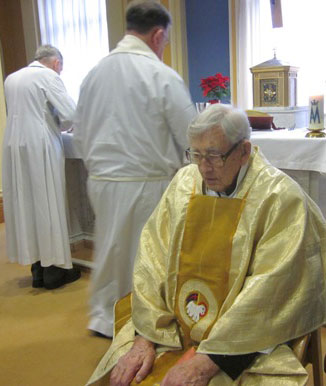

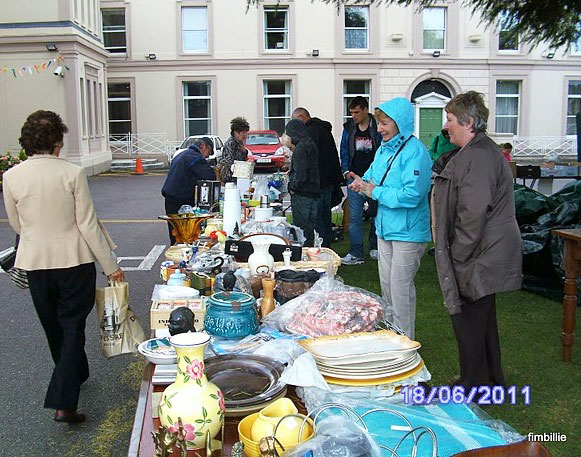


 One night Jesus appeared in a dream to a devout widow and told her that the next day he would come and visit her. Immediately the widow started to clean and polish the whole house. She had just finished when the doorbell rang and she ran and opened the door expectantly. But it was her daughter who lived nearby who asked her to look after her 3 year old son while she went shopping but the widow refused telling her she was too busy as she was expecting an important visitor. An hour later, the bell went again. She ran to the door and was annoyed to find a beggar there and said she couldn’t give him anything then as she was expecting an important visitor. In the afternoon the local priest came to ask her help but again she told him to come back tomorrow due to the important visitor expected. Bedtime came and she was very disappointed, as Jesus hadn’t come to her as promised. That night Jesus appeared to her again. “Three times today I tried to visit you but you never had time for me”. When the favorable time came you let it pass”
One night Jesus appeared in a dream to a devout widow and told her that the next day he would come and visit her. Immediately the widow started to clean and polish the whole house. She had just finished when the doorbell rang and she ran and opened the door expectantly. But it was her daughter who lived nearby who asked her to look after her 3 year old son while she went shopping but the widow refused telling her she was too busy as she was expecting an important visitor. An hour later, the bell went again. She ran to the door and was annoyed to find a beggar there and said she couldn’t give him anything then as she was expecting an important visitor. In the afternoon the local priest came to ask her help but again she told him to come back tomorrow due to the important visitor expected. Bedtime came and she was very disappointed, as Jesus hadn’t come to her as promised. That night Jesus appeared to her again. “Three times today I tried to visit you but you never had time for me”. When the favorable time came you let it pass”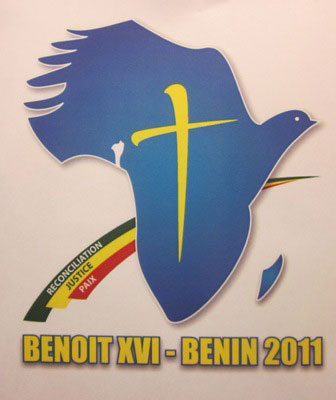
 From 18 – 20 November, Pope Benedict XVI visited Bénin Republic (formerly known as Dahomey), for the signing and publication of the post-synodal Apostolic Exhortation –
From 18 – 20 November, Pope Benedict XVI visited Bénin Republic (formerly known as Dahomey), for the signing and publication of the post-synodal Apostolic Exhortation –  The Society of African Missions has also grown in Bénin. Today, we have 25 priests on mission in the country. We have fourteen priests from the country, most of them on mission in other parts of Africa and elsewhere. The SMA International Spiritual Year programme for Africa is based at Centre Brésillac in Calavi, near Cotonou. Vocations to the priesthood – for the 10 dioceses, religious orders and societies – are flourishing.
The Society of African Missions has also grown in Bénin. Today, we have 25 priests on mission in the country. We have fourteen priests from the country, most of them on mission in other parts of Africa and elsewhere. The SMA International Spiritual Year programme for Africa is based at Centre Brésillac in Calavi, near Cotonou. Vocations to the priesthood – for the 10 dioceses, religious orders and societies – are flourishing. 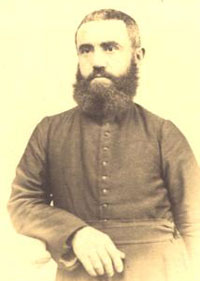
 Born near Genoa in 1830, he studied for the priesthood with the Benedictines in Subiaco near Rome and was ordained – for missionary work – on 27 December 1854. After waiting a further three years to be sent ‘on the missions’, he left Subiaco. He met Bishop de Brésillac in June 1858.
Born near Genoa in 1830, he studied for the priesthood with the Benedictines in Subiaco near Rome and was ordained – for missionary work – on 27 December 1854. After waiting a further three years to be sent ‘on the missions’, he left Subiaco. He met Bishop de Brésillac in June 1858. On their way to Ouidah in Dahomey, the three new SMA missionaries landed at the Canary Islands, Dakar and Freetown. There, sadly, Fr Edde died and was buried alongside Bishop de Brésillac and his four companions. Fathers Borghero and Fernandez arrived at the port of Ouidah on 18 April 1861. They were the founding missionaries of the Catholic Church on that part of the west coast of Africa. And it is that milestone that our Holy Father, Pope Benedict XVI, will celebrate during his visit to the Republic of Bénin from 18 – 20 November 2011.
On their way to Ouidah in Dahomey, the three new SMA missionaries landed at the Canary Islands, Dakar and Freetown. There, sadly, Fr Edde died and was buried alongside Bishop de Brésillac and his four companions. Fathers Borghero and Fernandez arrived at the port of Ouidah on 18 April 1861. They were the founding missionaries of the Catholic Church on that part of the west coast of Africa. And it is that milestone that our Holy Father, Pope Benedict XVI, will celebrate during his visit to the Republic of Bénin from 18 – 20 November 2011.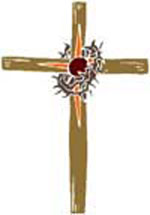
 In a certain country many hundreds of years ago the king wondered if all the honour and attention he got from the people was because of his position as king or simply because the people really cared for him. So one day he dressed as a beggar and stole out of the palace, went to the local market and sat down in the main square begging. He had decided to reward anyone who really showed interest in him. Nobody paid any attention to him except, near midday, an old woman came up to him, knelt before him and took out a piece of cloth. In it were some coins and she shared them with the disguised king saying she had been at the city gate which was the best place to beg. He thanked her and asked where she lived and she explained it was in a little hut by the river. Imagine her great astonishment when next morning the king now dressed as the king visited here and rewarded her very generously for her kindness. What the king gave her was out of all proportion to her gift to him.
In a certain country many hundreds of years ago the king wondered if all the honour and attention he got from the people was because of his position as king or simply because the people really cared for him. So one day he dressed as a beggar and stole out of the palace, went to the local market and sat down in the main square begging. He had decided to reward anyone who really showed interest in him. Nobody paid any attention to him except, near midday, an old woman came up to him, knelt before him and took out a piece of cloth. In it were some coins and she shared them with the disguised king saying she had been at the city gate which was the best place to beg. He thanked her and asked where she lived and she explained it was in a little hut by the river. Imagine her great astonishment when next morning the king now dressed as the king visited here and rewarded her very generously for her kindness. What the king gave her was out of all proportion to her gift to him.
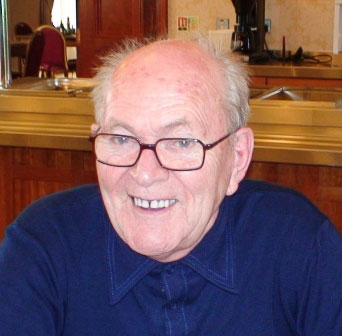
 Hugh McKeown, the son of Hugh P McKeown and Anna (née Keenan), was born in Belfast on 30 March 1925. The family lived on the Glen Road in the city. He is survived by his brother, Gabriel, and three sisters, Marie (Aylward), Frances (McGivern) and Eithne (Kelly).
Hugh McKeown, the son of Hugh P McKeown and Anna (née Keenan), was born in Belfast on 30 March 1925. The family lived on the Glen Road in the city. He is survived by his brother, Gabriel, and three sisters, Marie (Aylward), Frances (McGivern) and Eithne (Kelly).
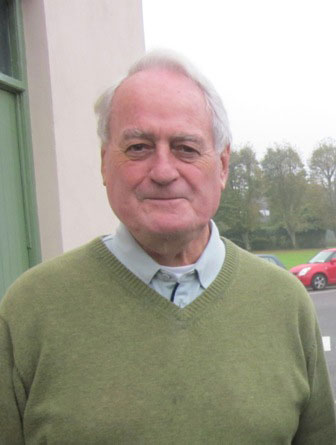
 Fr John O’Keeffe SMA has been appointed Leader of the SMA community at the African Missions, Wilton, Cork. He succeeds Fr Dan Cashman SMA who, after a six-year term, now takes up the position of Director of the SMA Wilton Promotion Office.
Fr John O’Keeffe SMA has been appointed Leader of the SMA community at the African Missions, Wilton, Cork. He succeeds Fr Dan Cashman SMA who, after a six-year term, now takes up the position of Director of the SMA Wilton Promotion Office.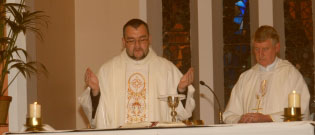

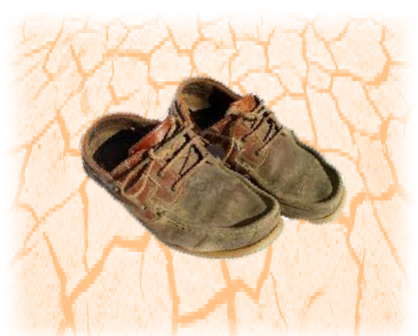

 Fr Kevin Conway SMA was one of ten SMA priests ordained in 2011. During the course of his studies – in Ireland, Philippines and Kenya – he was supported, both prayerfully and financially, by a vast legion of supporters throughout Ireland. They are members of the SMA Family Vocations Crusade (FVC). Fr Kevin celebrated with many members of the Family Vocations Crusade (FVC) at two centres in Connacht recently.
Fr Kevin Conway SMA was one of ten SMA priests ordained in 2011. During the course of his studies – in Ireland, Philippines and Kenya – he was supported, both prayerfully and financially, by a vast legion of supporters throughout Ireland. They are members of the SMA Family Vocations Crusade (FVC). Fr Kevin celebrated with many members of the Family Vocations Crusade (FVC) at two centres in Connacht recently. 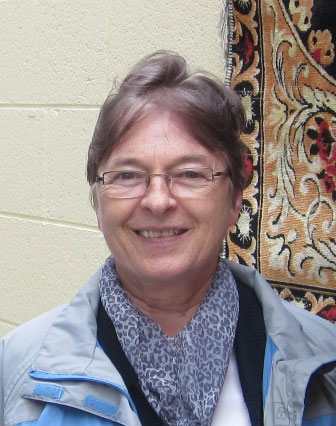
 Sr Eileen Cummins OLA, from Galway, was a missionary in Nigeria for many years. Later she was part of the pastoral team in the ‘Afrika Parish’ in Amsterdam. She has served on the OLA Provincial Council in Cork and later on the General Council in Rome. In Rome she served as Councillor and later as Superior General. Sr Eileen is now based in the OLA Convent, Ardfoyle, Cork.
Sr Eileen Cummins OLA, from Galway, was a missionary in Nigeria for many years. Later she was part of the pastoral team in the ‘Afrika Parish’ in Amsterdam. She has served on the OLA Provincial Council in Cork and later on the General Council in Rome. In Rome she served as Councillor and later as Superior General. Sr Eileen is now based in the OLA Convent, Ardfoyle, Cork. 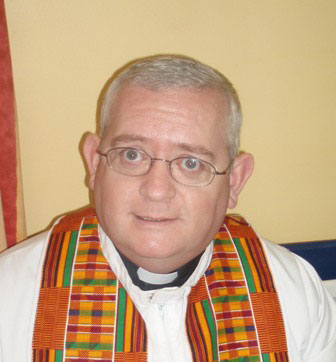
 Fr Malachy Flanagan preached on the first evening of the SMA National Novena in honour of St Thérèse, the Little Flower. Here is an edited version of his homily.
Fr Malachy Flanagan preached on the first evening of the SMA National Novena in honour of St Thérèse, the Little Flower. Here is an edited version of his homily.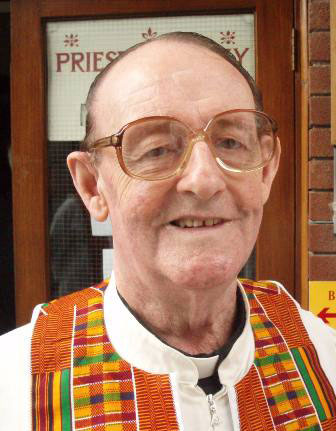
 Bernard John Raymond was born in Dublin on the Feast of St Andrew, 30 November 1931, the only child of James Raymond and Elizabeth (née Gallagher). The family had a Drapery shop at the junction of Botanic and Phibsborough Roads in Glasnevin, opposite the Brian Boru Pub. His father was from Kildare and his mother from Leitrim.
Bernard John Raymond was born in Dublin on the Feast of St Andrew, 30 November 1931, the only child of James Raymond and Elizabeth (née Gallagher). The family had a Drapery shop at the junction of Botanic and Phibsborough Roads in Glasnevin, opposite the Brian Boru Pub. His father was from Kildare and his mother from Leitrim. After the death of his parents, Fr Bennie was appointed to the Promotion team and spent several years visiting the parishes of Ireland as part of the SMA Mission Awareness programme. Recognizing his skills as a communicator and fund-raising abilities he was asked to return to Nigeria to help strengthen the SMA promotion work there. As the chief fund-raiser and Director of the Family Vocations Movement he travelled widely making the SMA known and inviting Nigerians to become involved in helping to support financially and through prayer the fledgling SMA African Foundation. In 1996, Bennie was asked to become Assistant to the Provincial Archivist, based in Blackrock Road, Cork. He served in this work until 2006 when increasing ill health made it necessary for him to retire from active work.
After the death of his parents, Fr Bennie was appointed to the Promotion team and spent several years visiting the parishes of Ireland as part of the SMA Mission Awareness programme. Recognizing his skills as a communicator and fund-raising abilities he was asked to return to Nigeria to help strengthen the SMA promotion work there. As the chief fund-raiser and Director of the Family Vocations Movement he travelled widely making the SMA known and inviting Nigerians to become involved in helping to support financially and through prayer the fledgling SMA African Foundation. In 1996, Bennie was asked to become Assistant to the Provincial Archivist, based in Blackrock Road, Cork. He served in this work until 2006 when increasing ill health made it necessary for him to retire from active work. This article originally appeared on
This article originally appeared on  Boko Haram followers went from the use of guns to experimentation with homemade bombs and their attacks increased on government offices, churches and drinking places. St. Patrick’s Cathedral, Maiduguri was badly damaged in one of these bomb explosions as were a number of other churches in 2010 and 2011. Several of the would-be bombers died when one of their bombs exploded prematurely.
Boko Haram followers went from the use of guns to experimentation with homemade bombs and their attacks increased on government offices, churches and drinking places. St. Patrick’s Cathedral, Maiduguri was badly damaged in one of these bomb explosions as were a number of other churches in 2010 and 2011. Several of the would-be bombers died when one of their bombs exploded prematurely. The latest and most high profile bombing carried out by Boko Haram was on the United Nations offices in Abuja on 26th August which resulted in the deaths of at least 23 people with over 70 injured and massive damage to the building.
The latest and most high profile bombing carried out by Boko Haram was on the United Nations offices in Abuja on 26th August which resulted in the deaths of at least 23 people with over 70 injured and massive damage to the building.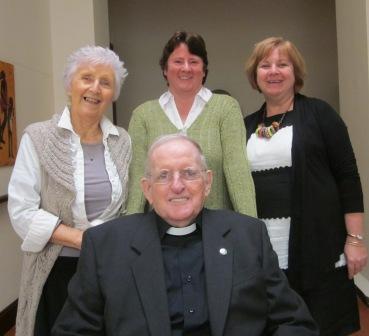
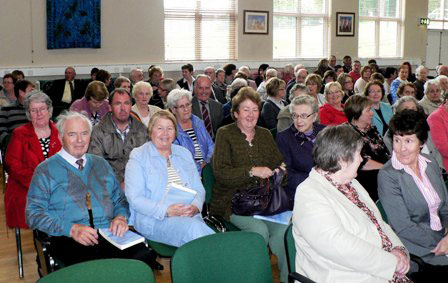

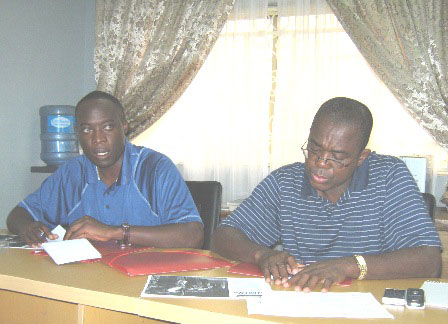
 On right some of the participants pictured outside the InterFaith Council Office in Abuja. Fr Basil Soyoye SMA, Superior of the Bight of Benin District-in-formation is on extreme right of the picture.
On right some of the participants pictured outside the InterFaith Council Office in Abuja. Fr Basil Soyoye SMA, Superior of the Bight of Benin District-in-formation is on extreme right of the picture.
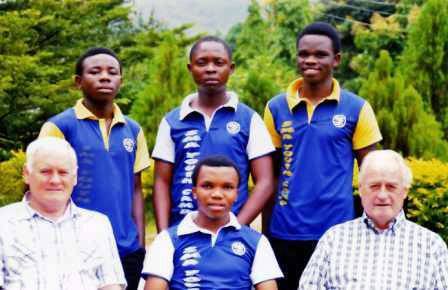
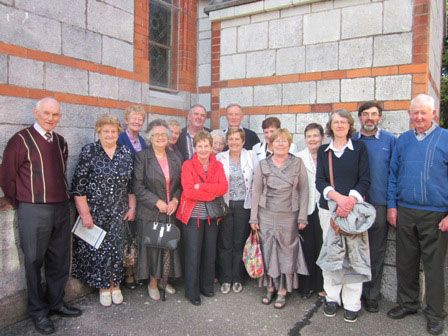

 Fr Kevin was one of 10 to be ordained in 2011. All of them completed their training in one of three seminaries in Africa: CFMA Abidjan (Ivory Coast), Ss Peter & Paul’s Major seminary Ibadan (Nigeria) or Tangaza College, Nairobi (Kenya). The financial cost of training so many young men is substantial. The contribution from our FVC Sponsors to those costs is significant. But our Sponsors are also a powerhouse of prayer for our students (and all Society members). Our pictures show some of the Sponsors who attended the Mass and the ‘Cup of Tea’ afterwards in the adjoining SMA Parish Centre.
Fr Kevin was one of 10 to be ordained in 2011. All of them completed their training in one of three seminaries in Africa: CFMA Abidjan (Ivory Coast), Ss Peter & Paul’s Major seminary Ibadan (Nigeria) or Tangaza College, Nairobi (Kenya). The financial cost of training so many young men is substantial. The contribution from our FVC Sponsors to those costs is significant. But our Sponsors are also a powerhouse of prayer for our students (and all Society members). Our pictures show some of the Sponsors who attended the Mass and the ‘Cup of Tea’ afterwards in the adjoining SMA Parish Centre.
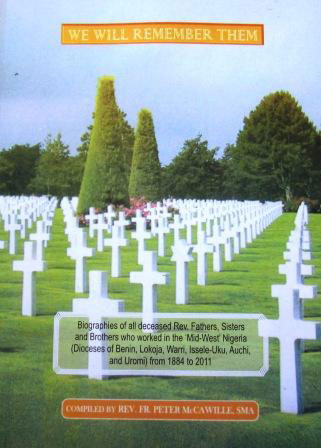
 Fr Peter McCawille SMA has produced a timely memoir of the early SMA and other missionaries who worked in what was known in the past as MidWest Nigeria. Today it covers Bayelsa, Delta and Edo states in the 36 State Federal Republic of Nigeria.
Fr Peter McCawille SMA has produced a timely memoir of the early SMA and other missionaries who worked in what was known in the past as MidWest Nigeria. Today it covers Bayelsa, Delta and Edo states in the 36 State Federal Republic of Nigeria.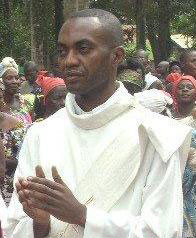
 29 September 1992 was an historic day for the Society of African Missions. On that day, Michael Adrie, became the first SMA priest in the African Foundation, ordained by Bishop Francis Lodonu of the Keta-Ho diocese, Ghana.
29 September 1992 was an historic day for the Society of African Missions. On that day, Michael Adrie, became the first SMA priest in the African Foundation, ordained by Bishop Francis Lodonu of the Keta-Ho diocese, Ghana. Around 9 million people in the Horn of Africa are in need of humanitarian aid. This crisis has been caused by a combination of drought, high food prices and the on-going conflict in Somalia. Those affected most are the poorest and weakest many of whom have died or have been forced to leave their homes in search of food.
Around 9 million people in the Horn of Africa are in need of humanitarian aid. This crisis has been caused by a combination of drought, high food prices and the on-going conflict in Somalia. Those affected most are the poorest and weakest many of whom have died or have been forced to leave their homes in search of food. We also ask for your prayers for the people of the region and for all those who are working to provide them with assistance at this time
We also ask for your prayers for the people of the region and for all those who are working to provide them with assistance at this time ealthy young Spaniard, set out with his family to settle in Central America during the period when this vast southern continent was being colonised by Spain. The year was 1502-03. At this time the colonisers were fast becoming “conquistadores” – bullying conquerors. However the newcomers had already discovered that they weren’t on virgin territory but that people had already been living there – for centuries. But they were strange – “savage” – “natives”. Some Churchmen as well as politicians even argued that these people had no “souls”, and therefore were little less than animals! They simply had a complete inability to accept ethnic and racial difference as in any way equal to white Europeans.
ealthy young Spaniard, set out with his family to settle in Central America during the period when this vast southern continent was being colonised by Spain. The year was 1502-03. At this time the colonisers were fast becoming “conquistadores” – bullying conquerors. However the newcomers had already discovered that they weren’t on virgin territory but that people had already been living there – for centuries. But they were strange – “savage” – “natives”. Some Churchmen as well as politicians even argued that these people had no “souls”, and therefore were little less than animals! They simply had a complete inability to accept ethnic and racial difference as in any way equal to white Europeans.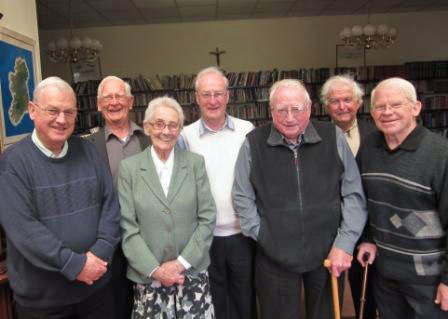
 Maureen O’Sullivan, From Cahirciveen, Co Kerry qualified in the 1940’s as a Nurse and Midwife. Her first assignment was as a District Nurse in Cabra, Dublin.
Maureen O’Sullivan, From Cahirciveen, Co Kerry qualified in the 1940’s as a Nurse and Midwife. Her first assignment was as a District Nurse in Cabra, Dublin. Nearing her 89th birthday, Maureen has never lost her love for the missions and remains an SMA supporter in many ways.
Nearing her 89th birthday, Maureen has never lost her love for the missions and remains an SMA supporter in many ways.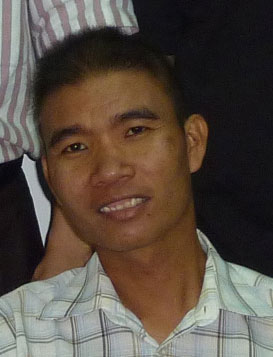
 The death has taken place, after a brief illness, of the youngest SMA Filipino priest, Fr Bembolio de los Santos, on 7 July 2011.
The death has taken place, after a brief illness, of the youngest SMA Filipino priest, Fr Bembolio de los Santos, on 7 July 2011.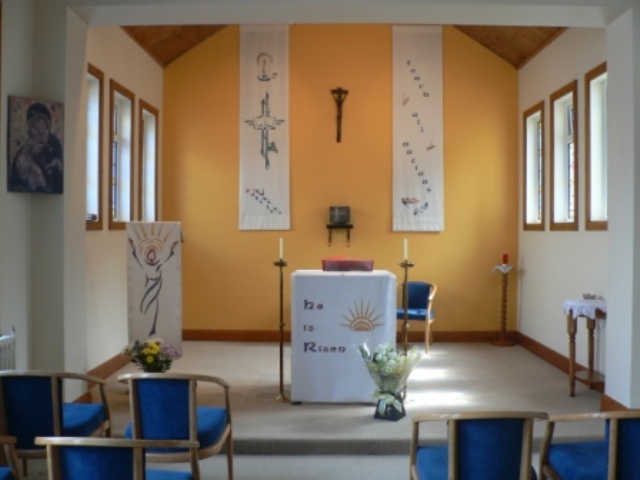
 Pictured left is the recently-refurbished Small Oratory in St Brigid’s wing at Dromantine.
Pictured left is the recently-refurbished Small Oratory in St Brigid’s wing at Dromantine.
 At the conclusion of the annual SMA Retreat in the Dromantine Retreat & Conference Centre, Newry the Irish Province marked the Silver Jubilee of the ordination to the priesthood of Fathers Eugene McLoughlin (on right of our picture) and Noel O’Leary (on left). More than 50 priests, led by the Provincial Leader, Fr Fachtna O’Driscoll, joined in the concelebrated Mass in St Theresa’s Oratory.
At the conclusion of the annual SMA Retreat in the Dromantine Retreat & Conference Centre, Newry the Irish Province marked the Silver Jubilee of the ordination to the priesthood of Fathers Eugene McLoughlin (on right of our picture) and Noel O’Leary (on left). More than 50 priests, led by the Provincial Leader, Fr Fachtna O’Driscoll, joined in the concelebrated Mass in St Theresa’s Oratory. I have known Eugene and Noel since our days in Maynooth in the late 70’s and early 80’s. And while by the time we left Maynooth, in 1983, there may have been signs of change, a slowing down in the number of vocations, we could not have imagined that we were approaching the end of an era.
I have known Eugene and Noel since our days in Maynooth in the late 70’s and early 80’s. And while by the time we left Maynooth, in 1983, there may have been signs of change, a slowing down in the number of vocations, we could not have imagined that we were approaching the end of an era. When Noel and Eugene began their training in Wilton, Cork it was under the initial guidance of Fr Seamus Nohilly (on left in this picture) and Fr Peter Thompson (right).
When Noel and Eugene began their training in Wilton, Cork it was under the initial guidance of Fr Seamus Nohilly (on left in this picture) and Fr Peter Thompson (right). Today, we feel gratitude. We SMA’s are a reticent group. Rejoicing, effervescence is not often part of our vocabulary or demeanour. Indeed I was downright scared by some of the exuberance I experienced during my sabbatical in California. (Every time we came to the sign of peace at liturgies I almost panicked – what would they come up with next?). It has become downright counter-cultural for us in the Irish Province, or Irish Religious / Church members to actually be upbeat. But there are times when we should blow our own trumpets, like David dance in the presence of the Lord. We have learnt by now that nobody else will do this for us. We must tell our own story, sing our own song.
Today, we feel gratitude. We SMA’s are a reticent group. Rejoicing, effervescence is not often part of our vocabulary or demeanour. Indeed I was downright scared by some of the exuberance I experienced during my sabbatical in California. (Every time we came to the sign of peace at liturgies I almost panicked – what would they come up with next?). It has become downright counter-cultural for us in the Irish Province, or Irish Religious / Church members to actually be upbeat. But there are times when we should blow our own trumpets, like David dance in the presence of the Lord. We have learnt by now that nobody else will do this for us. We must tell our own story, sing our own song. Refugee Day. Have you ever thought about why people come here from other countries? Those who arrive with nothing, maybe not even a passport, and end up in “reception centres”, hostels, sometimes prison. Why would anyone want to leave their families and loved ones, their culture, country, all that helped them feel “at home” and come here, to a small island nation at the edge of the North Atlantic, to live dependent, sometimes for years, on meagre “hand-outs” from the State, and be forbidden to work? Wouldn’t it have to be something extremely dire before any of us would do that?
Refugee Day. Have you ever thought about why people come here from other countries? Those who arrive with nothing, maybe not even a passport, and end up in “reception centres”, hostels, sometimes prison. Why would anyone want to leave their families and loved ones, their culture, country, all that helped them feel “at home” and come here, to a small island nation at the edge of the North Atlantic, to live dependent, sometimes for years, on meagre “hand-outs” from the State, and be forbidden to work? Wouldn’t it have to be something extremely dire before any of us would do that?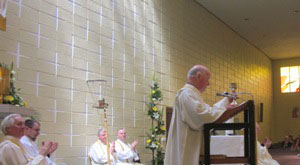
 “Bishop Harrington, fellow priests, people of Donagheady, and visitors from far and near, I am very happy to be here today to share with Kevin and the whole Conway family and friends what is a memorable event in the life of this parish.
“Bishop Harrington, fellow priests, people of Donagheady, and visitors from far and near, I am very happy to be here today to share with Kevin and the whole Conway family and friends what is a memorable event in the life of this parish.
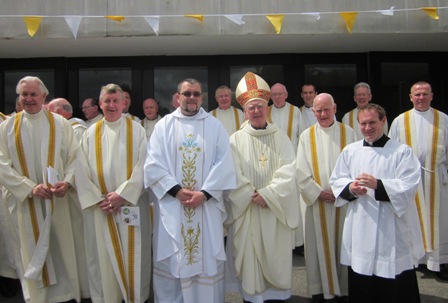



 After the meal we had the opportunity to watch different scenes from Fr Kevin’s life. Some brought laughter, others perhaps a tear, especially at pictures of those no longer with us. But no doubt they were looking down on us from their place of rest.
After the meal we had the opportunity to watch different scenes from Fr Kevin’s life. Some brought laughter, others perhaps a tear, especially at pictures of those no longer with us. But no doubt they were looking down on us from their place of rest.
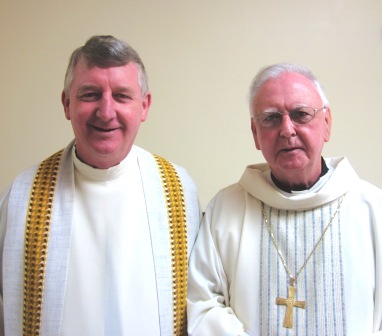
 Homily preached by Fr Fachtna O’Driscoll SMA, Irish Provincial Leader, at the Ordination to the Priesthood of Kevin Conway SMA in St Patrick’s Church, Dunamanagh, Co Tyrone on 18th June 2011. He is pictured here with Bishop Patrick J Harrington SMA, Bishop-emeritus of Lodwar, Kenya.
Homily preached by Fr Fachtna O’Driscoll SMA, Irish Provincial Leader, at the Ordination to the Priesthood of Kevin Conway SMA in St Patrick’s Church, Dunamanagh, Co Tyrone on 18th June 2011. He is pictured here with Bishop Patrick J Harrington SMA, Bishop-emeritus of Lodwar, Kenya. But SMA or mission is not new to Dunamanagh. We remember with affection today the late SMA Fathers Tommy Blee and Michael McGlinchey, both buried in the cemetery at Aughabrack. Sr Dolores Kearney of the Missionary Sisters of Our Lady of Apostles and Fr Paddy Dooher of the Columban Missionaries [both present here today] are other examples of the great missionary tradition from this local church in this part of the diocese of Derry.
But SMA or mission is not new to Dunamanagh. We remember with affection today the late SMA Fathers Tommy Blee and Michael McGlinchey, both buried in the cemetery at Aughabrack. Sr Dolores Kearney of the Missionary Sisters of Our Lady of Apostles and Fr Paddy Dooher of the Columban Missionaries [both present here today] are other examples of the great missionary tradition from this local church in this part of the diocese of Derry. Fr Kevin distributing Holy Communion after his Ordination.
Fr Kevin distributing Holy Communion after his Ordination. The honour of serving as priest is not an honour you take on yourself. You are called to this life; it is a vocation. You have answered the call but you never possess the call. It is always God who calls and leads. Even Christ himself did not take upon himself the glory of becoming high priest.
The honour of serving as priest is not an honour you take on yourself. You are called to this life; it is a vocation. You have answered the call but you never possess the call. It is always God who calls and leads. Even Christ himself did not take upon himself the glory of becoming high priest.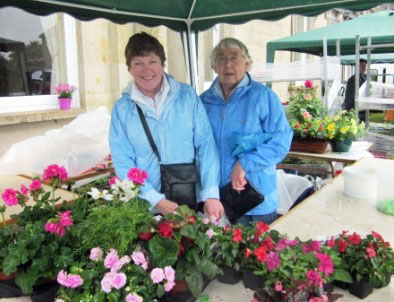

 As soon as I hopped out of bed early on Sunday morning I looked out – praise God – a bright dry morning and so it remained.
As soon as I hopped out of bed early on Sunday morning I looked out – praise God – a bright dry morning and so it remained.
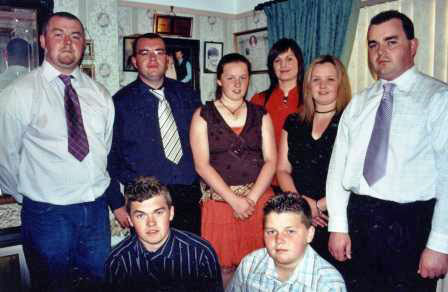
 Kevin, the son of Liam and Anne Conway (née Conwell), has four brothers and three sisters. Our picture shows Kevin, second from left, Gerard, Christine, Gemma, Marie, Stephen, Brian and Paul.
Kevin, the son of Liam and Anne Conway (née Conwell), has four brothers and three sisters. Our picture shows Kevin, second from left, Gerard, Christine, Gemma, Marie, Stephen, Brian and Paul.

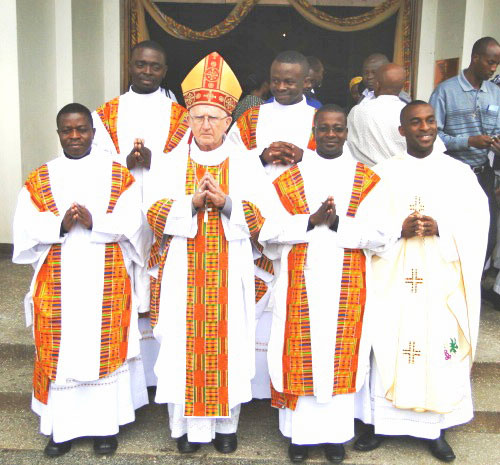

 at you don’t know another person until you’ve walked around in their shoes. Perhaps this month we might try to do that through this story telling of a young African from Burundi:
at you don’t know another person until you’ve walked around in their shoes. Perhaps this month we might try to do that through this story telling of a young African from Burundi: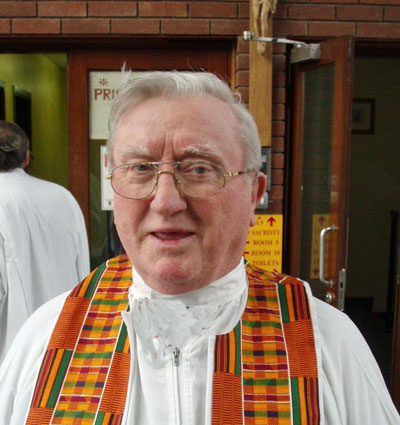

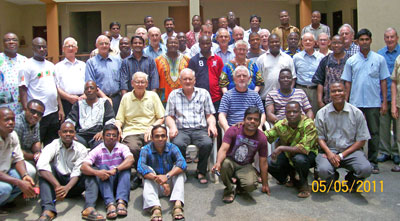

 Our picture shows Fr Michael Waters SMA (Cork City) works in Kontagora Vicariate and Fr Julius Temuyi SMA (Badagry, Nigeria) who is due to leave for the SMA mission in Egypt. Badagry and its environs has been ‘home’ for Fr Eddie Hartnett SMA (Ballinlough, Cork) for more than 25 of his 45 years in the Archdiocese of Lagos. Fr Hartnett is on the extreme right of the group photo above.
Our picture shows Fr Michael Waters SMA (Cork City) works in Kontagora Vicariate and Fr Julius Temuyi SMA (Badagry, Nigeria) who is due to leave for the SMA mission in Egypt. Badagry and its environs has been ‘home’ for Fr Eddie Hartnett SMA (Ballinlough, Cork) for more than 25 of his 45 years in the Archdiocese of Lagos. Fr Hartnett is on the extreme right of the group photo above.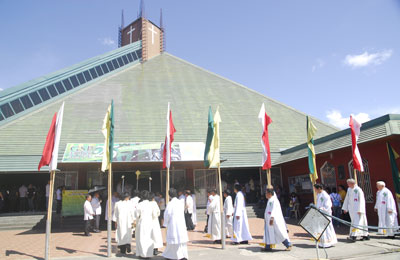

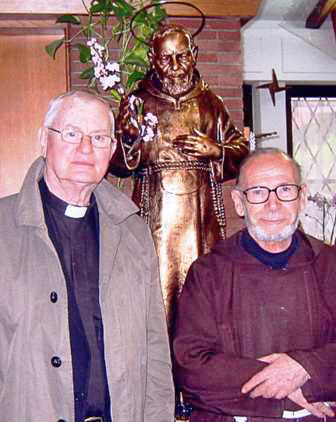
 Fr Sean Hayes SMA writes about his recent pilgrimage to San Giovanni Rotondo, the Shrine of Santo Pio. Fr Sean is pictured here with the Guardian, Fr Ermelindo OFM Cap.
Fr Sean Hayes SMA writes about his recent pilgrimage to San Giovanni Rotondo, the Shrine of Santo Pio. Fr Sean is pictured here with the Guardian, Fr Ermelindo OFM Cap. 
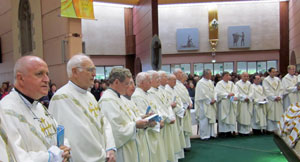

 From early morning until just before the 3pm Mass many pilgrims took time out to celebrate the Sacrament of Reconciliation in the Confession Chapel (pictured). Many SMA priests took turns to hear Confessions throughout the day, adding to the regular Confessors who provide this service every day to the many thousands who come to Knock every day of the year.
From early morning until just before the 3pm Mass many pilgrims took time out to celebrate the Sacrament of Reconciliation in the Confession Chapel (pictured). Many SMA priests took turns to hear Confessions throughout the day, adding to the regular Confessors who provide this service every day to the many thousands who come to Knock every day of the year. The Missionary Sisters of Our Lady of Apostles (OLA) and St Louis Sisters, who work in many parts of Nigeria, alongside the SMA missionaries, also participated in the Pilgrimage. It was a wonderful opportunity for remembering their shared missionary service. Mercy Sisters also joined with us as did a Scottish group led by Bishop John Mone, emeritus bishop of Paisley.
The Missionary Sisters of Our Lady of Apostles (OLA) and St Louis Sisters, who work in many parts of Nigeria, alongside the SMA missionaries, also participated in the Pilgrimage. It was a wonderful opportunity for remembering their shared missionary service. Mercy Sisters also joined with us as did a Scottish group led by Bishop John Mone, emeritus bishop of Paisley. Holy Communion was brought to the congregation by the concelebrating priests who moved through the different chapels to those who wanted to receive.
Holy Communion was brought to the congregation by the concelebrating priests who moved through the different chapels to those who wanted to receive.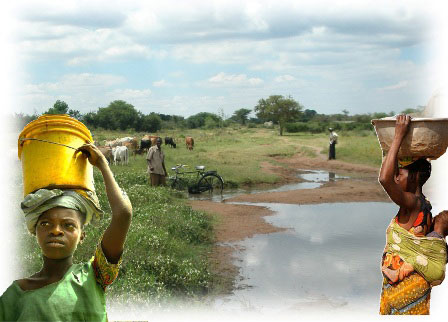

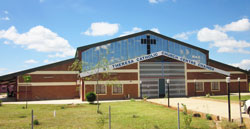

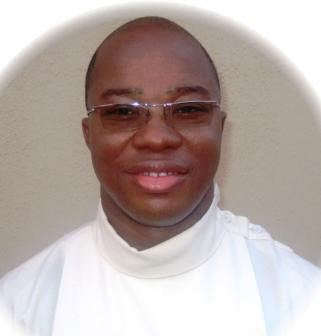
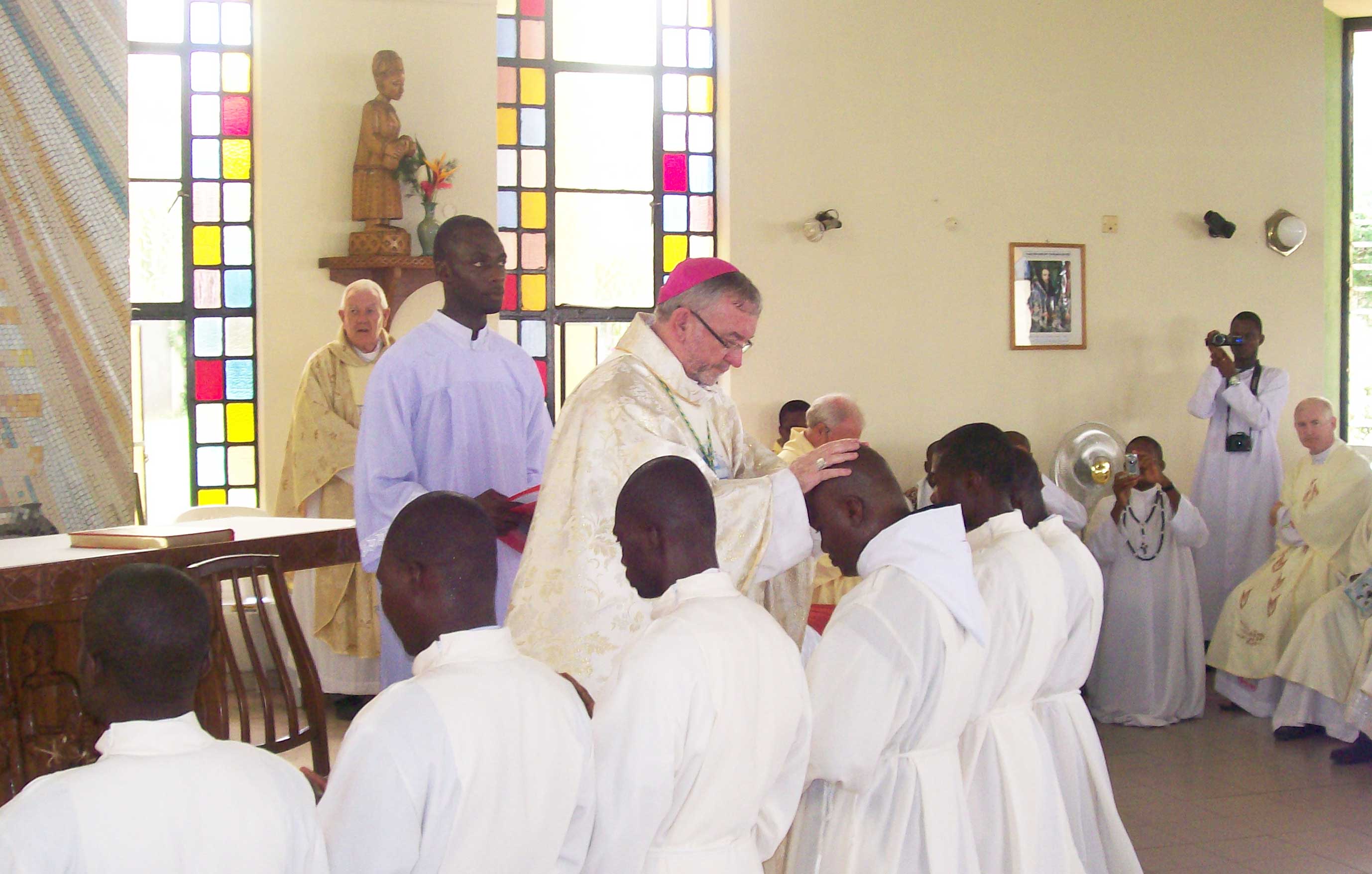


 Easter, the feast we have recently been celebrating, is about experiencing renewed life, promise, hope. “Christ is Risen!” is the greeting exchanged in France among Christians. “Happy Easter” is a lot less specific and a lot more vague, spoken more as a wish than as a statement of faith. But the challenge is to make our words a statement that means something today, while our world is going through such huge convulsions.
Easter, the feast we have recently been celebrating, is about experiencing renewed life, promise, hope. “Christ is Risen!” is the greeting exchanged in France among Christians. “Happy Easter” is a lot less specific and a lot more vague, spoken more as a wish than as a statement of faith. But the challenge is to make our words a statement that means something today, while our world is going through such huge convulsions.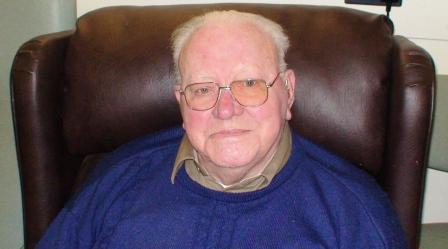

 Fr Pat Kelly SMA (from Belfast) shares his reflection on the meaning of Easter.
Fr Pat Kelly SMA (from Belfast) shares his reflection on the meaning of Easter.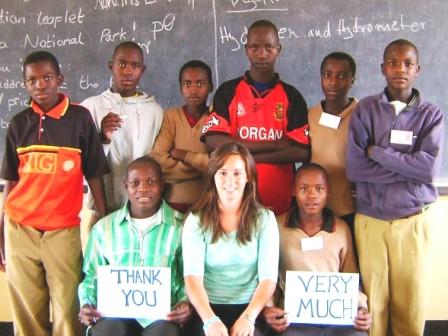


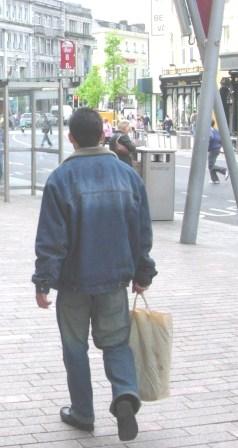
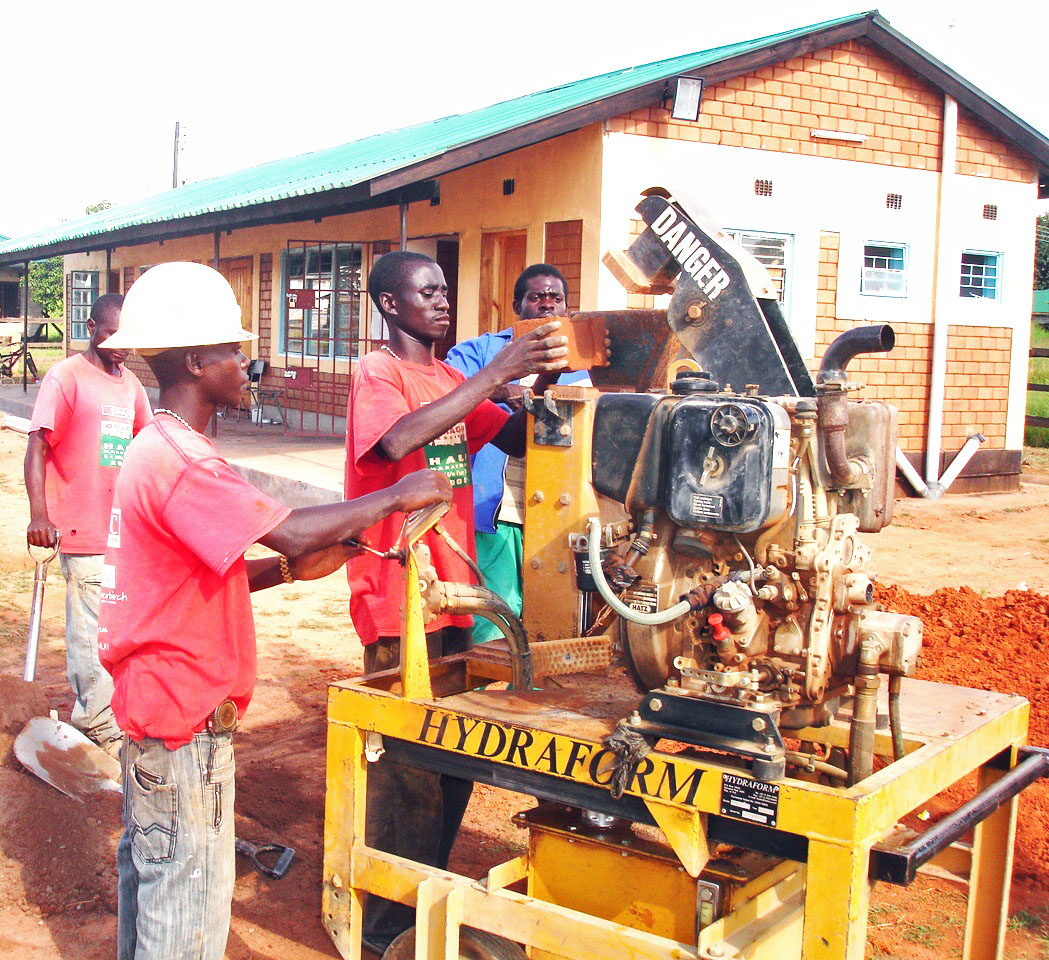

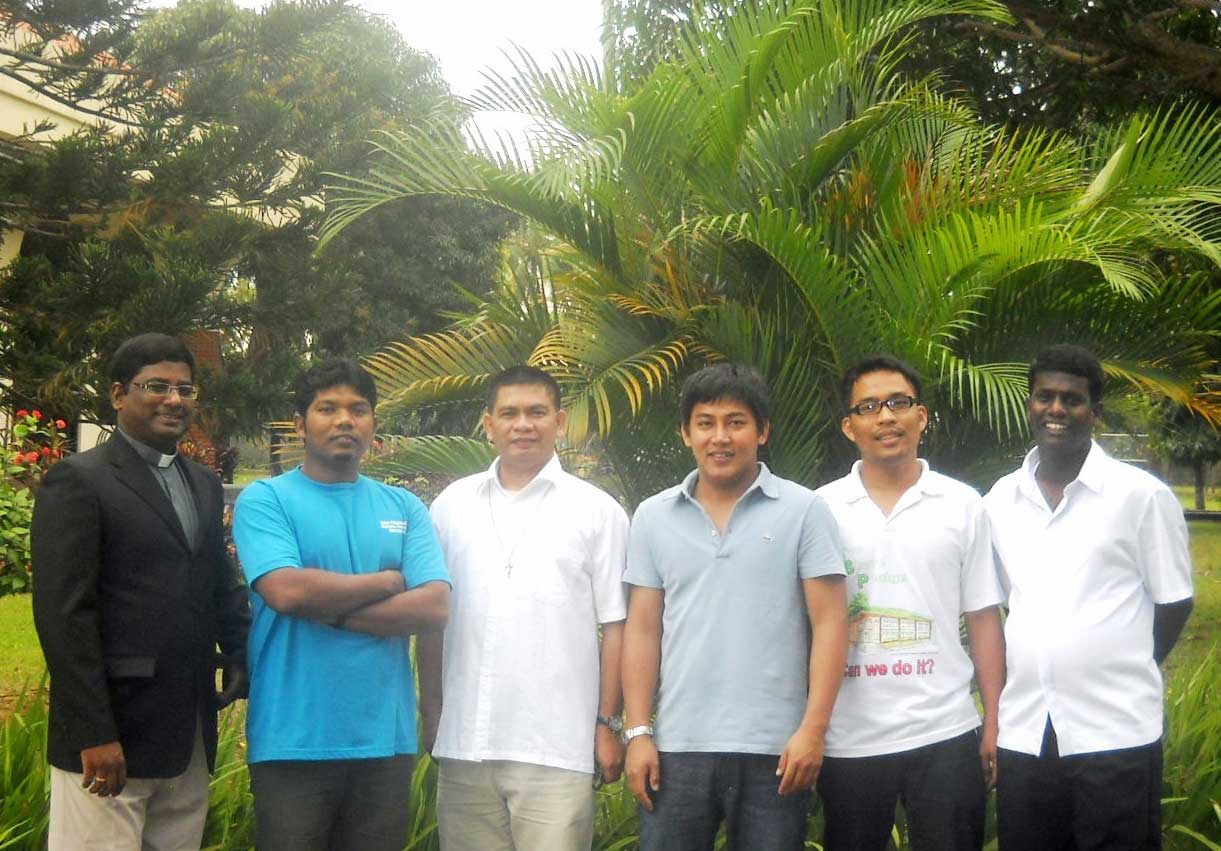

 Some time ago I was speaking to a young man of about 27 years. He wanted to make a decision. He had been going with his girlfriend for the previous two years and he felt the time had come for him to decide whether to marry her or not. He listed many good qualities she had but he still wasn’t sure. He said also ‘when I see so many marriages nowadays ending up with couples separating how can I be certain the same won’t happen to us if we marry’. The simple answer is, of course, he can’t be certain. What would you think of this young man if before marrying he wanted every guarantee and assurance that he was not going to make a mistake in marrying his girlfriend? Many would regard him as a very calculating young man who had not much of a heart to give.
Some time ago I was speaking to a young man of about 27 years. He wanted to make a decision. He had been going with his girlfriend for the previous two years and he felt the time had come for him to decide whether to marry her or not. He listed many good qualities she had but he still wasn’t sure. He said also ‘when I see so many marriages nowadays ending up with couples separating how can I be certain the same won’t happen to us if we marry’. The simple answer is, of course, he can’t be certain. What would you think of this young man if before marrying he wanted every guarantee and assurance that he was not going to make a mistake in marrying his girlfriend? Many would regard him as a very calculating young man who had not much of a heart to give.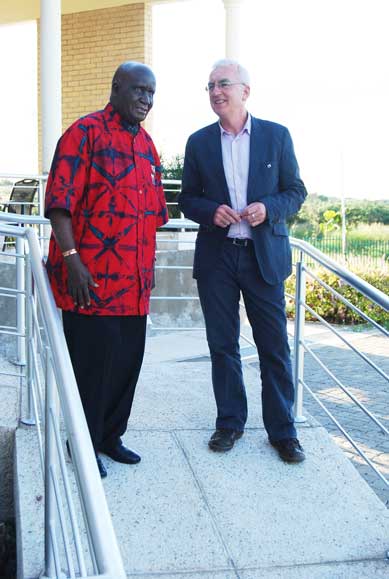

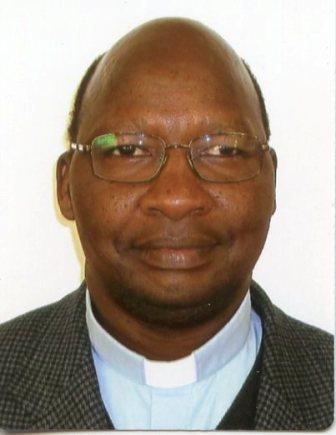
 Fr Joseph Ekomwa is a priest of Lodwar diocese, studying at the Angelicum University in Rome. With the installation last month of the third bishop of Lodwar, Rt Rev Dominic Kimengich, Fr Ekomwa wrote to the CISA News Agency about the event and gave a very good overview of the development of the Church in Turkana.
Fr Joseph Ekomwa is a priest of Lodwar diocese, studying at the Angelicum University in Rome. With the installation last month of the third bishop of Lodwar, Rt Rev Dominic Kimengich, Fr Ekomwa wrote to the CISA News Agency about the event and gave a very good overview of the development of the Church in Turkana. In his general audience in St. Peter’s Square today, attended by more than 10,000 people, Benedict XVI dedicated his catechesis to St. Therese of Lisieux, or St. Therese of the Child Jesus and the Holy Face, “who lived in this world for only twenty-four years at the end of the nineteenth century, leading a very simple and hidden life, but who, after her death and the publication of her writings, became one of the best-known and loved saints“.
In his general audience in St. Peter’s Square today, attended by more than 10,000 people, Benedict XVI dedicated his catechesis to St. Therese of Lisieux, or St. Therese of the Child Jesus and the Holy Face, “who lived in this world for only twenty-four years at the end of the nineteenth century, leading a very simple and hidden life, but who, after her death and the publication of her writings, became one of the best-known and loved saints“.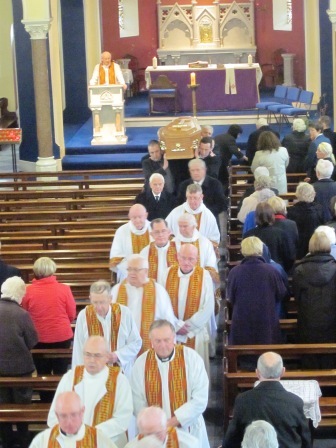
 He attended Primary School at St Patrick’s, St Luke’s Cross. From there he went on to Christian Brother’s College. He had a lifelong interest in all sports, and at CBC he played and developed an interest in rugby, though hurling was always his first love. In fact, rugby involvement was to cause him some grief later, as during one holiday period he broke his nose playing rugby; this necessitated missing some weeks of class and eventually he was asked to repeat the full year.
He attended Primary School at St Patrick’s, St Luke’s Cross. From there he went on to Christian Brother’s College. He had a lifelong interest in all sports, and at CBC he played and developed an interest in rugby, though hurling was always his first love. In fact, rugby involvement was to cause him some grief later, as during one holiday period he broke his nose playing rugby; this necessitated missing some weeks of class and eventually he was asked to repeat the full year.
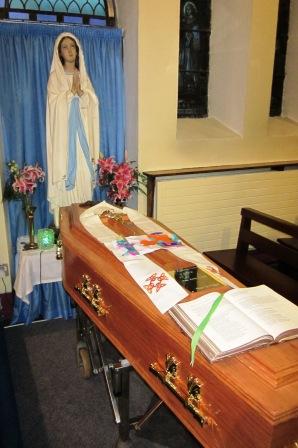



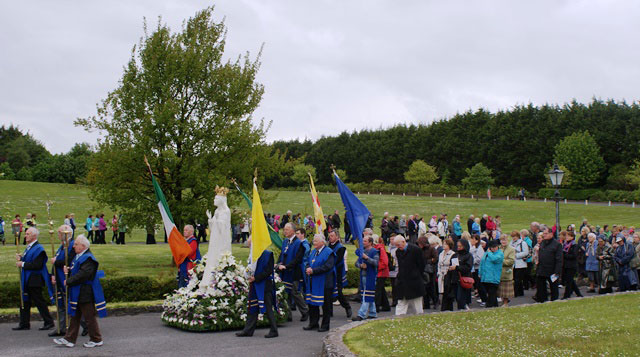

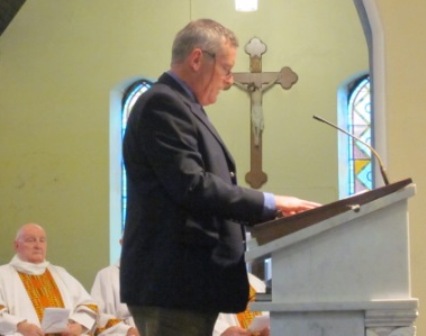
 Hugh Hayes reads the Second reading during the funeral Mass for his late uncle Jim.
Hugh Hayes reads the Second reading during the funeral Mass for his late uncle Jim.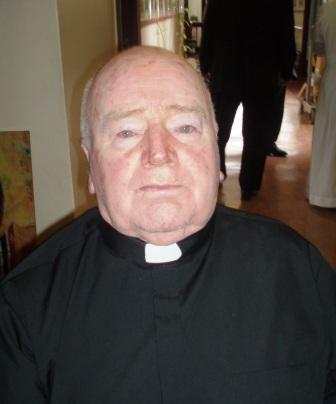




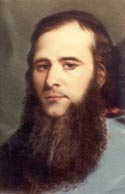

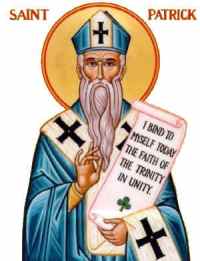
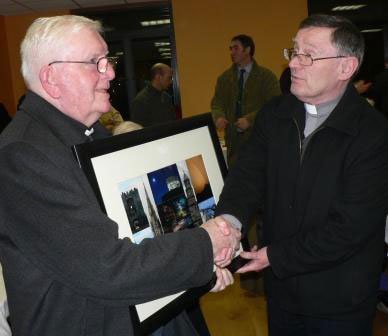
 The evening Mass on Saturday, 4 February 2012, in St Peter’s Church, Drogheda, was the occasion for the official farewell by the parishioners to a much-loved priest, Fr Sean Ryan SMA, who after 54 years of priestly ministry was taking a well-deserved rest. Fr Sean was the Principal celebrant, assisted by Rt Rev Monsignor James Carroll (Parish Priest) and Fr John Denvir SMA, representing the Society of African Missions and Co-Leader of the SMA community in Dromantine, Newry where Fr Ryan will now live. In a sense, Fr Sean is going back to his roots for it was in Dromantine that he studied for the priesthood all those years ago.
The evening Mass on Saturday, 4 February 2012, in St Peter’s Church, Drogheda, was the occasion for the official farewell by the parishioners to a much-loved priest, Fr Sean Ryan SMA, who after 54 years of priestly ministry was taking a well-deserved rest. Fr Sean was the Principal celebrant, assisted by Rt Rev Monsignor James Carroll (Parish Priest) and Fr John Denvir SMA, representing the Society of African Missions and Co-Leader of the SMA community in Dromantine, Newry where Fr Ryan will now live. In a sense, Fr Sean is going back to his roots for it was in Dromantine that he studied for the priesthood all those years ago.
 Kinshasa (Agenzia Fides) – The suspension of mining activities in some areas of east Democratic Republic of Congo is creating problems for law-abiding producers, but has not halted illegal mining of the Country’s natural resources. This was announced by the Network for Peace in the Congo, promoted by missionaries working in the Country. On 10 September President Kabila decreed the suspension of mining and exportation of minerals in the three provinces of North Kivu, South Kivu and Maniema. This decision was taken to withhold funds from the active armed groups and thereby save the mining sector.
Kinshasa (Agenzia Fides) – The suspension of mining activities in some areas of east Democratic Republic of Congo is creating problems for law-abiding producers, but has not halted illegal mining of the Country’s natural resources. This was announced by the Network for Peace in the Congo, promoted by missionaries working in the Country. On 10 September President Kabila decreed the suspension of mining and exportation of minerals in the three provinces of North Kivu, South Kivu and Maniema. This decision was taken to withhold funds from the active armed groups and thereby save the mining sector.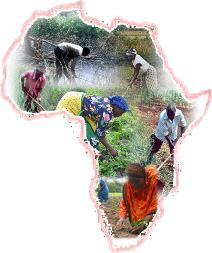
 Take a minute to change a woman’s life.
Take a minute to change a woman’s life. 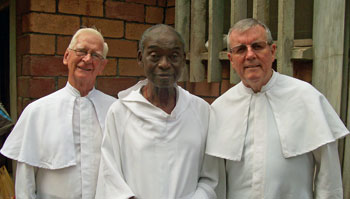

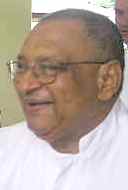
 The resignation of Most Rev Michael Kpakala Francis (pictured left) as Archbishop of Monrovia,
The resignation of Most Rev Michael Kpakala Francis (pictured left) as Archbishop of Monrovia, 

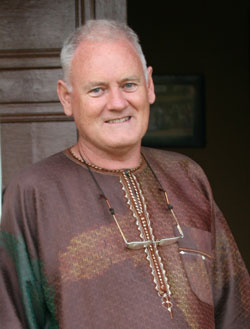
 Saturday, 29 January 2011, saw the official opening and blessing of the new Headquarters for the SMA in Nigeria. The Archbishop of Abuja, Most Rev John Olorunfemi Onaiyekan, presided at the Mass to celebrate this further milestone in the SMA story in Nigeria. Last October the two Regions in Nigeria were united under the leadership of Fathers Maurice Henry (from Clara, Co Offaly, pictured above) and his Deputy, Fr Narcisse Seka-Ogou (from Ivory Coast) who is also the Parish Priest at the Holy Family Church in Abuja.
Saturday, 29 January 2011, saw the official opening and blessing of the new Headquarters for the SMA in Nigeria. The Archbishop of Abuja, Most Rev John Olorunfemi Onaiyekan, presided at the Mass to celebrate this further milestone in the SMA story in Nigeria. Last October the two Regions in Nigeria were united under the leadership of Fathers Maurice Henry (from Clara, Co Offaly, pictured above) and his Deputy, Fr Narcisse Seka-Ogou (from Ivory Coast) who is also the Parish Priest at the Holy Family Church in Abuja. The SMA Superior General, Fr Jean-Marie Guillaume, presided at the meeting.
The SMA Superior General, Fr Jean-Marie Guillaume, presided at the meeting.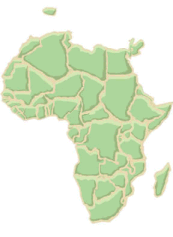
 Human Rights Watch are reporting that more than 200 people have died as a result on the ongoing tensions between different ethnic groups. According to Reuters Africa the source of the problem lies in the conflict between indigenous groups, mainly Christian or animist, and settlers who have come in from further north. Each is competing for control of fertile farmlands and economic and political power. As already reported in other articles most of the violence is in Plateau State. And with the Presidential elections due later this year tensions are sure to increase.
Human Rights Watch are reporting that more than 200 people have died as a result on the ongoing tensions between different ethnic groups. According to Reuters Africa the source of the problem lies in the conflict between indigenous groups, mainly Christian or animist, and settlers who have come in from further north. Each is competing for control of fertile farmlands and economic and political power. As already reported in other articles most of the violence is in Plateau State. And with the Presidential elections due later this year tensions are sure to increase.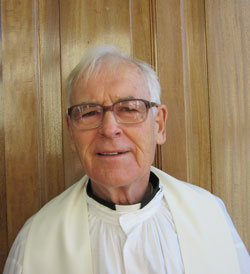
 Father John O’Hea SMA celebrated his Golden Jubilee as a priest on 21 December 2010. A native of Woodfield, Clonakilty he was born in 1932. Following his brother James he entered the SMA and was ordained a priest in 1960. He was appointed to the then diocese of Ibadan. Thirty four years later he shared the joy of the people of Ibadan when it was raised to the status of an Archdiocese with the Most Rev Felix Alaba Adeosin Job as the first Metropolitan Archbishop.
Father John O’Hea SMA celebrated his Golden Jubilee as a priest on 21 December 2010. A native of Woodfield, Clonakilty he was born in 1932. Following his brother James he entered the SMA and was ordained a priest in 1960. He was appointed to the then diocese of Ibadan. Thirty four years later he shared the joy of the people of Ibadan when it was raised to the status of an Archdiocese with the Most Rev Felix Alaba Adeosin Job as the first Metropolitan Archbishop.
 A Holy Mass in honour of the first anniversary of the death of Bishop John Moore SMA was held at St. John the Evangelist Cathedral, Bauchi (pictured) on 20th January, 2011. This marks exactly one year to the day he died at St Vincent’s Hospital, Dublin, Ireland. Bishop Moore was buried in the SMA community cemetery in Wilton, Cork on 23 January 2010.
A Holy Mass in honour of the first anniversary of the death of Bishop John Moore SMA was held at St. John the Evangelist Cathedral, Bauchi (pictured) on 20th January, 2011. This marks exactly one year to the day he died at St Vincent’s Hospital, Dublin, Ireland. Bishop Moore was buried in the SMA community cemetery in Wilton, Cork on 23 January 2010. Fr Keane (pictured right with Fr Cletus Ikpa, the diocesan Master of Ceremonies) said everyone was confused when the shocking news of the death of Bishop John Moore SMA was announced last year. However he was grateful to God that the diocese was able to move on despite the large vacuum created by the death of the late Bishop. He assured everyone that Bauchi Diocese will continue to grow and urged the Priests, Religious and the Laity to support this cause.
Fr Keane (pictured right with Fr Cletus Ikpa, the diocesan Master of Ceremonies) said everyone was confused when the shocking news of the death of Bishop John Moore SMA was announced last year. However he was grateful to God that the diocese was able to move on despite the large vacuum created by the death of the late Bishop. He assured everyone that Bauchi Diocese will continue to grow and urged the Priests, Religious and the Laity to support this cause.

 Abidjan (Agenzia Fides) – Between attempts at dialogue and signs of a possible military intervention, the international community continues to add pressure to relieve Côte d’Ivoire from the political-institutional crisis provoked by the refusal of outgoing President, Laurent Gbagbo, to recognise the victory of Alassane Ouattara in the presidential election of 28 November.
Abidjan (Agenzia Fides) – Between attempts at dialogue and signs of a possible military intervention, the international community continues to add pressure to relieve Côte d’Ivoire from the political-institutional crisis provoked by the refusal of outgoing President, Laurent Gbagbo, to recognise the victory of Alassane Ouattara in the presidential election of 28 November.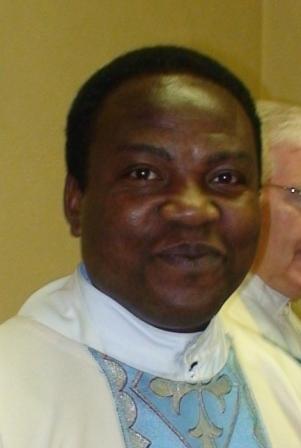


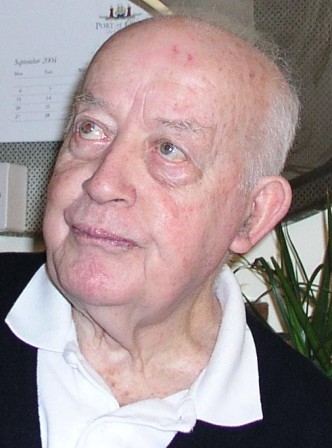

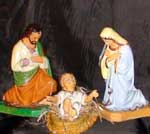
 A certain couple decided to have a party just before Christmas to celebrate the 80th birthday of the husband’s father. It was a great celebration and went on much later than expected. So the wife said:‘Let us leave everything and go to bed. Tomorrow we can sleep late and then we’ll clean up’. She struggled out of bed at 10 o’clock with everyone else still asleep. She had more or less just cleaned one room when the front doorbell sounded. The last thing she wanted was visitors with so much cleaning still to be done. When she opened the door there facing her was a family of five – a couple she had not seen for years and their 3 children plus a dog. ‘We were just passing by and decided to call in’. There was nothing else to do but to welcome them. Luckily she had just cleaned one room and put them inside. She gave them cups of tea and biscuits and then more tea and biscuits. They shared with each other how life had been since they last met. Eventually the visitors decided to leave saying their good-byes. Their last remark was: ‘Isn’t it great you have nothing else to do but to make cups of tea and entertain visitors’. As we can imagine she could have gladly strangled them but simply smiled.
A certain couple decided to have a party just before Christmas to celebrate the 80th birthday of the husband’s father. It was a great celebration and went on much later than expected. So the wife said:‘Let us leave everything and go to bed. Tomorrow we can sleep late and then we’ll clean up’. She struggled out of bed at 10 o’clock with everyone else still asleep. She had more or less just cleaned one room when the front doorbell sounded. The last thing she wanted was visitors with so much cleaning still to be done. When she opened the door there facing her was a family of five – a couple she had not seen for years and their 3 children plus a dog. ‘We were just passing by and decided to call in’. There was nothing else to do but to welcome them. Luckily she had just cleaned one room and put them inside. She gave them cups of tea and biscuits and then more tea and biscuits. They shared with each other how life had been since they last met. Eventually the visitors decided to leave saying their good-byes. Their last remark was: ‘Isn’t it great you have nothing else to do but to make cups of tea and entertain visitors’. As we can imagine she could have gladly strangled them but simply smiled.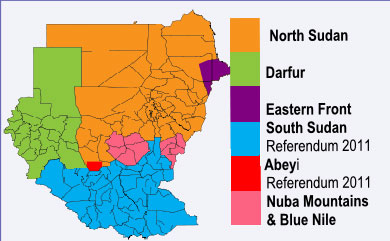
 Sudan is at a crossroads. The “interim period” that helped to end the twenty two year civil-war in 2005 is coming to an end and in January 2011 the people of southern Sudan are due to vote in a Referendum to decide whether they remain part of Sudan or succeed and become an independent state.
Sudan is at a crossroads. The “interim period” that helped to end the twenty two year civil-war in 2005 is coming to an end and in January 2011 the people of southern Sudan are due to vote in a Referendum to decide whether they remain part of Sudan or succeed and become an independent state. 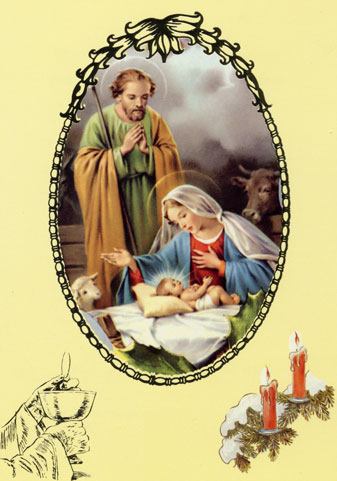
 I was once travelling in a bus and in the seat in front of me was a young woman with a little girl of about 2 years. It was the week before Christmas. The little girl turned round and smiled at me and at an elderly woman next to me who said to the little girl: ‘Santa’. She immediately replied ‘ho, ho, ho’. This is the traditional call of Santa to children. I wondered who taught this to the little girl. It reminded me of the tremendous influence we can have on children for better or for worse. Another story bears this out.
I was once travelling in a bus and in the seat in front of me was a young woman with a little girl of about 2 years. It was the week before Christmas. The little girl turned round and smiled at me and at an elderly woman next to me who said to the little girl: ‘Santa’. She immediately replied ‘ho, ho, ho’. This is the traditional call of Santa to children. I wondered who taught this to the little girl. It reminded me of the tremendous influence we can have on children for better or for worse. Another story bears this out.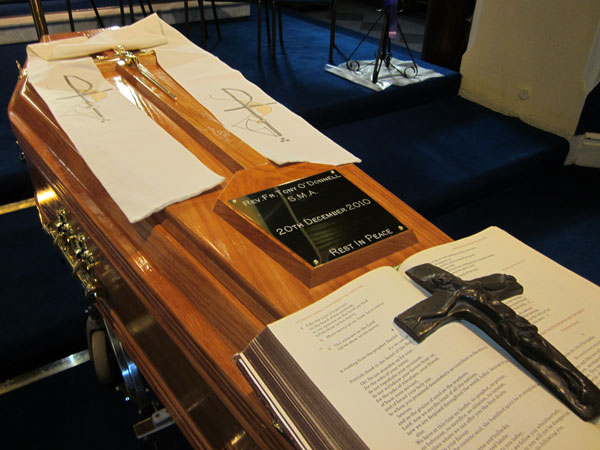
 Advent is waiting time. A time of preparation for the re-enactment of the coming into this world of Jesus the Son of God, the Second Person of the Blessed Trinity. Jesus came in the quiet of Christmas night. His being among us changed the character of all relationships: all people in His Kingdom have equal dignity. His continuing presence among us through His Spirit is the guarantee that His Kingdom is among us and will reach its fullness in God’s own time. How appropriate, then, that Tony [or Anthony as he was better known in his family and home neighbourhood] should conclude his long waiting during this season. His waiting was particularly acute during these past days; but we can honestly say that he has been waiting to return to the Lord for the past months and even years. It was waiting time too for the SMA community at Blackrock Road and his close friends who sat in accompaniment by his bedside from hour to hour as he journeyed home.
Advent is waiting time. A time of preparation for the re-enactment of the coming into this world of Jesus the Son of God, the Second Person of the Blessed Trinity. Jesus came in the quiet of Christmas night. His being among us changed the character of all relationships: all people in His Kingdom have equal dignity. His continuing presence among us through His Spirit is the guarantee that His Kingdom is among us and will reach its fullness in God’s own time. How appropriate, then, that Tony [or Anthony as he was better known in his family and home neighbourhood] should conclude his long waiting during this season. His waiting was particularly acute during these past days; but we can honestly say that he has been waiting to return to the Lord for the past months and even years. It was waiting time too for the SMA community at Blackrock Road and his close friends who sat in accompaniment by his bedside from hour to hour as he journeyed home. Some of Fr Tony’s great friends who were able to make it from Donegal, Cavan and Cork for the funeral Mass.
Some of Fr Tony’s great friends who were able to make it from Donegal, Cavan and Cork for the funeral Mass. Mary Leahy reads some of the Prayers of the Faithful.
Mary Leahy reads some of the Prayers of the Faithful. Assisting Fr O’Driscoll (left) were (from right) Fr Hugh Harkin SMA, Bishop Kieran O’Reilly SMA and Fr Oscar Welsh SMA as well as more thyan 30 other priests from the SMA and St Patrick’s Missionary Society.
Assisting Fr O’Driscoll (left) were (from right) Fr Hugh Harkin SMA, Bishop Kieran O’Reilly SMA and Fr Oscar Welsh SMA as well as more thyan 30 other priests from the SMA and St Patrick’s Missionary Society.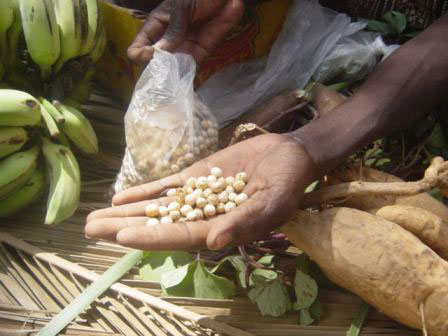
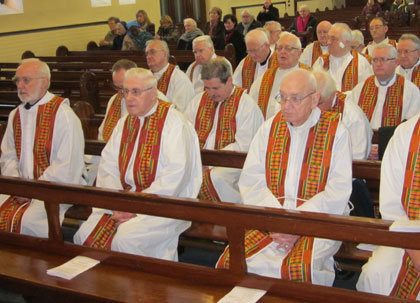

 At the end of Mass we accompanied Tony to his final resting place. His friends from home accompanied his mortal remains to the adjoining SMA Cemetery. There, Fr O’Driscoll commended him to the ground until the Day of Resurrection. During the blessing of Fr Tony’s remains Joanne again played a tune to accompany the incense as it rose to the heavens. Fr Hugh Harkin SMA, who remembers a young Fr Anthony O’Donnell SMA visiting St Eunan’s College, Letterkenny to talk about ‘the missions’, recited a decade of the Rosary.
At the end of Mass we accompanied Tony to his final resting place. His friends from home accompanied his mortal remains to the adjoining SMA Cemetery. There, Fr O’Driscoll commended him to the ground until the Day of Resurrection. During the blessing of Fr Tony’s remains Joanne again played a tune to accompany the incense as it rose to the heavens. Fr Hugh Harkin SMA, who remembers a young Fr Anthony O’Donnell SMA visiting St Eunan’s College, Letterkenny to talk about ‘the missions’, recited a decade of the Rosary.

 Injustice three:
Injustice three:
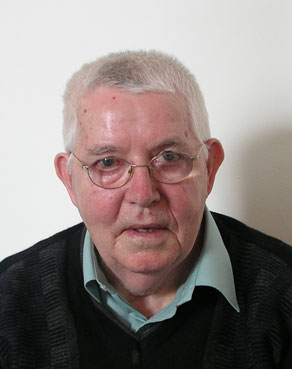

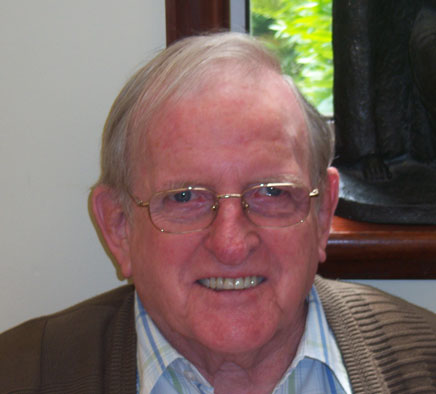


 From 1982 – 1988, Michael served as the FVC Director for Munster, living at the SMA House in Blackrock Road, Cork. This job entailed travelling all over Munster meeting with our FVC supporters who help us in the education of students for the priesthood. During that time he built up a huge network of, not just SMA supporters, but also great friends, many of whom deeply mourn the news of his death. As FVC Director, Michael returned to visit Owo in Nigeria and wrote an article in the African Missionary magazine about it. He is pictured here with some of the workers at the SMA House in Challenge.
From 1982 – 1988, Michael served as the FVC Director for Munster, living at the SMA House in Blackrock Road, Cork. This job entailed travelling all over Munster meeting with our FVC supporters who help us in the education of students for the priesthood. During that time he built up a huge network of, not just SMA supporters, but also great friends, many of whom deeply mourn the news of his death. As FVC Director, Michael returned to visit Owo in Nigeria and wrote an article in the African Missionary magazine about it. He is pictured here with some of the workers at the SMA House in Challenge. In December 2011, Michael celebrated the 50th Anniversary of his priestly ordination. Earlier in the year, when those of his classmates who are still on mission in Nigeria and South Africa were home on holidays, there was a Provincial celebration in Blackrock Road and many well-deserved tributes were paid to Mick and his classmates for their faithful service.
In December 2011, Michael celebrated the 50th Anniversary of his priestly ordination. Earlier in the year, when those of his classmates who are still on mission in Nigeria and South Africa were home on holidays, there was a Provincial celebration in Blackrock Road and many well-deserved tributes were paid to Mick and his classmates for their faithful service.
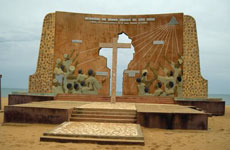

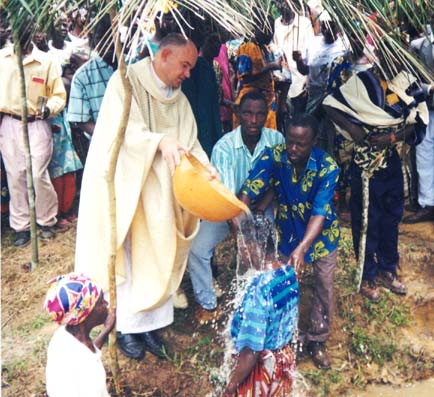
 Today we celebrate Mission Sunday. All over the world sermons will be preached about ‘the missions’. Here in Ireland there is hardly a family that has not had some connection with ‘the missions’ – be it a family member, a friend, involvement in fund-raising for some ‘mission’ country…
Today we celebrate Mission Sunday. All over the world sermons will be preached about ‘the missions’. Here in Ireland there is hardly a family that has not had some connection with ‘the missions’ – be it a family member, a friend, involvement in fund-raising for some ‘mission’ country… There is 1 priest for every 5,000 people (in Europe it’s 1 for every 1,471). Nearly two thirds of the priests working in Africa are Africans. The remainder are the missionaries. From being a missionary Society of European and North Americans, the SMA now proudly number in our ranks priests from 13 African countries as well as from India and Philippines. In 2013, the SMA ordained 23 priests from Africa.
There is 1 priest for every 5,000 people (in Europe it’s 1 for every 1,471). Nearly two thirds of the priests working in Africa are Africans. The remainder are the missionaries. From being a missionary Society of European and North Americans, the SMA now proudly number in our ranks priests from 13 African countries as well as from India and Philippines. In 2013, the SMA ordained 23 priests from Africa.
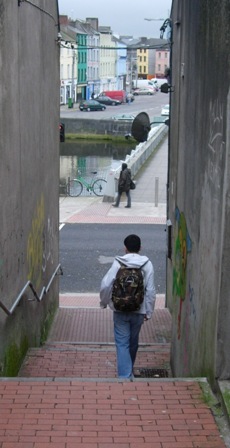
 Homily delivered by Fr Fachtna O’Driscoll SMA, Provincial Leader at the closing Mass of the Novena in honour of St Thérèse of Lisieux, celebrated at the National Shrine to the Little Flower at St Joseph’s SMA Parish, Blackrock Road, Cork
Homily delivered by Fr Fachtna O’Driscoll SMA, Provincial Leader at the closing Mass of the Novena in honour of St Thérèse of Lisieux, celebrated at the National Shrine to the Little Flower at St Joseph’s SMA Parish, Blackrock Road, Cork 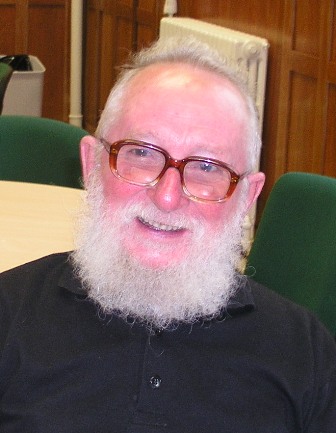

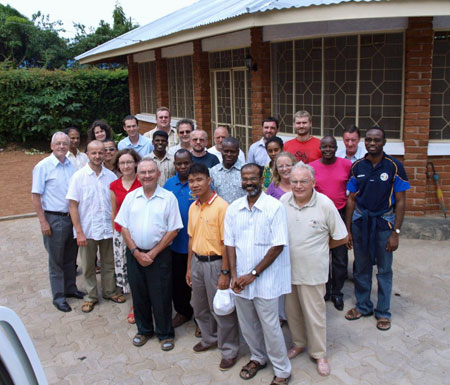

You must be logged in to post a comment.